Global Human Resource Management
VerifiedAdded on 2023/04/24
|20
|5540
|261
AI Summary
The purpose of this report is to analyse the environment of China in terms of expanding business based on European culture. The report discusses the cultural differences between France and China and how it affects the HRM approach of Le Costbucks, a French coffee bar planning to expand in China. The report suggests a geocentric approach to operate the business within the Chinese market. The report also explores ethical issues faced by migrated employees and issues related to terms and conditions of employment within a subsidiary store at foreign field.
Contribute Materials
Your contribution can guide someone’s learning journey. Share your
documents today.
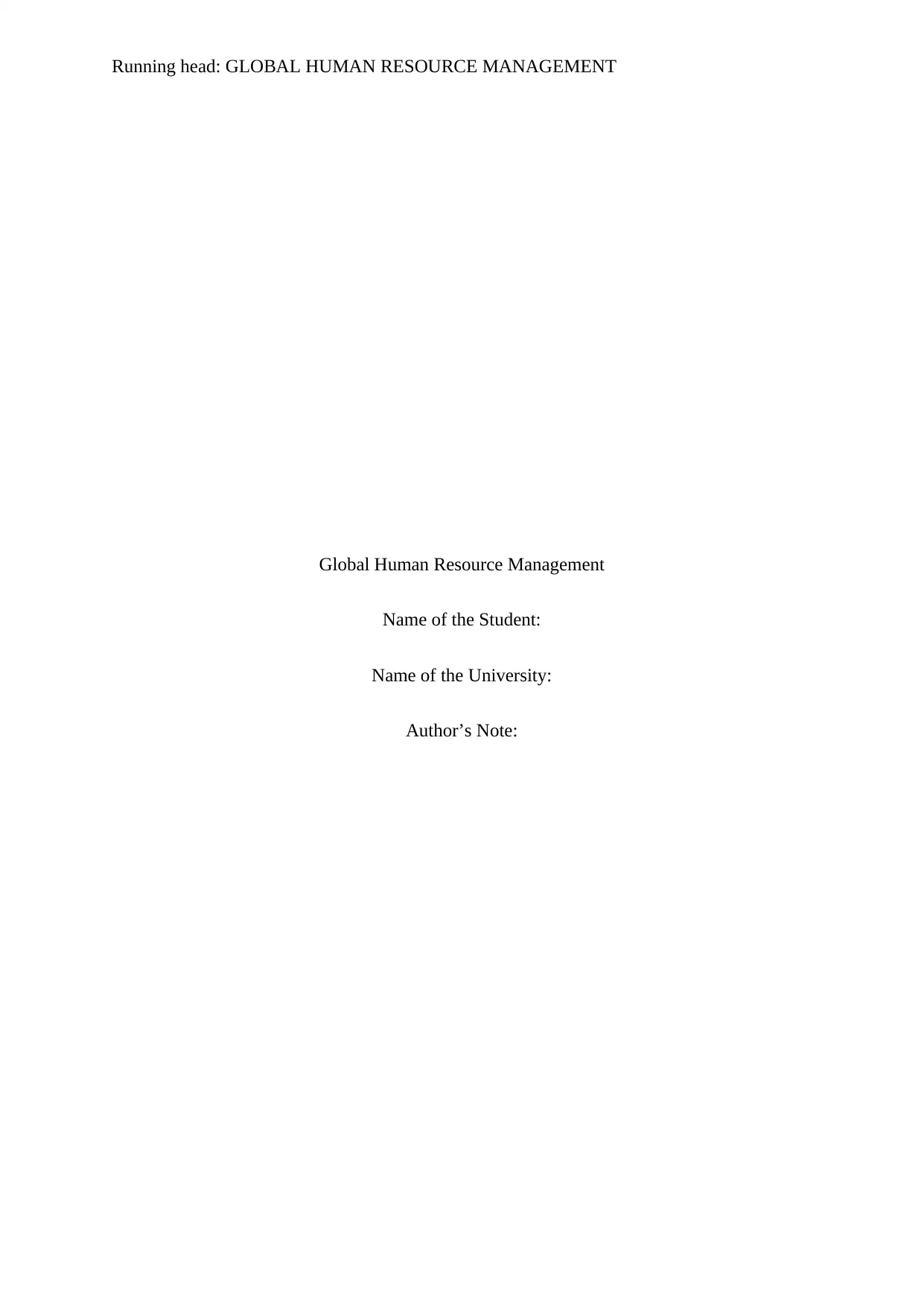
Running head: GLOBAL HUMAN RESOURCE MANAGEMENT
Global Human Resource Management
Name of the Student:
Name of the University:
Author’s Note:
Global Human Resource Management
Name of the Student:
Name of the University:
Author’s Note:
Secure Best Marks with AI Grader
Need help grading? Try our AI Grader for instant feedback on your assignments.
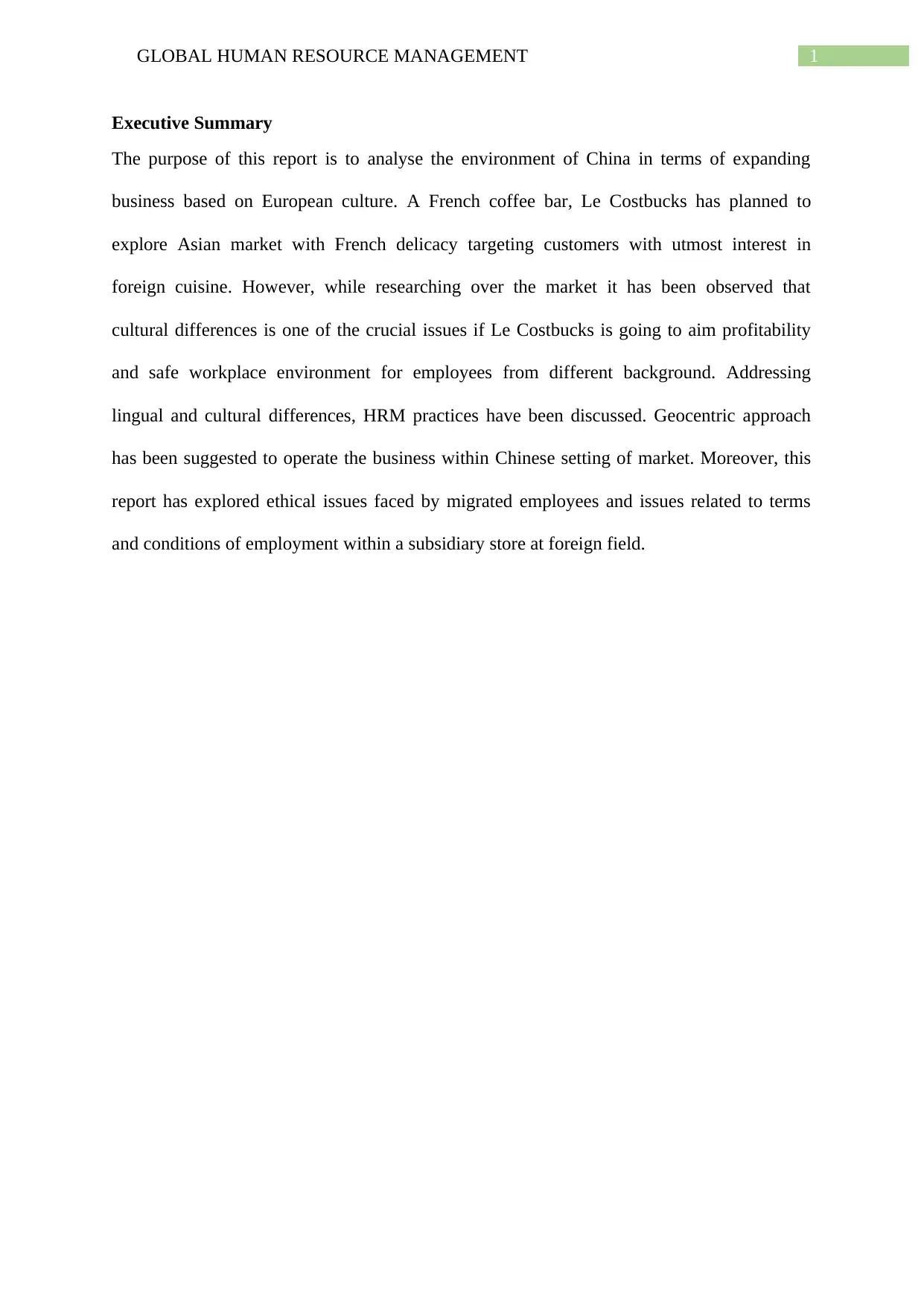
1GLOBAL HUMAN RESOURCE MANAGEMENT
Executive Summary
The purpose of this report is to analyse the environment of China in terms of expanding
business based on European culture. A French coffee bar, Le Costbucks has planned to
explore Asian market with French delicacy targeting customers with utmost interest in
foreign cuisine. However, while researching over the market it has been observed that
cultural differences is one of the crucial issues if Le Costbucks is going to aim profitability
and safe workplace environment for employees from different background. Addressing
lingual and cultural differences, HRM practices have been discussed. Geocentric approach
has been suggested to operate the business within Chinese setting of market. Moreover, this
report has explored ethical issues faced by migrated employees and issues related to terms
and conditions of employment within a subsidiary store at foreign field.
Executive Summary
The purpose of this report is to analyse the environment of China in terms of expanding
business based on European culture. A French coffee bar, Le Costbucks has planned to
explore Asian market with French delicacy targeting customers with utmost interest in
foreign cuisine. However, while researching over the market it has been observed that
cultural differences is one of the crucial issues if Le Costbucks is going to aim profitability
and safe workplace environment for employees from different background. Addressing
lingual and cultural differences, HRM practices have been discussed. Geocentric approach
has been suggested to operate the business within Chinese setting of market. Moreover, this
report has explored ethical issues faced by migrated employees and issues related to terms
and conditions of employment within a subsidiary store at foreign field.
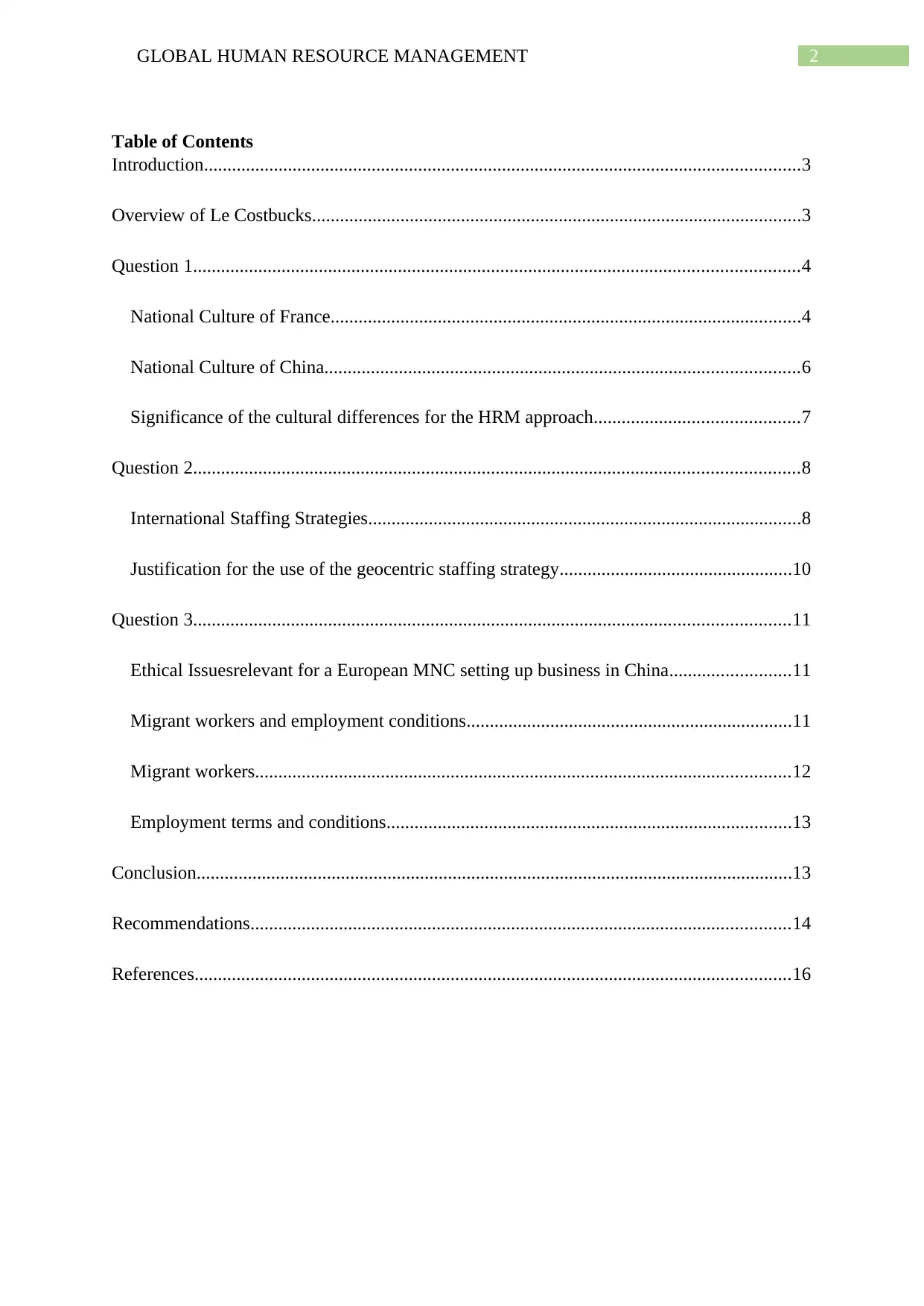
2GLOBAL HUMAN RESOURCE MANAGEMENT
Table of Contents
Introduction................................................................................................................................3
Overview of Le Costbucks.........................................................................................................3
Question 1..................................................................................................................................4
National Culture of France.....................................................................................................4
National Culture of China......................................................................................................6
Significance of the cultural differences for the HRM approach............................................7
Question 2..................................................................................................................................8
International Staffing Strategies.............................................................................................8
Justification for the use of the geocentric staffing strategy..................................................10
Question 3................................................................................................................................11
Ethical Issuesrelevant for a European MNC setting up business in China..........................11
Migrant workers and employment conditions......................................................................11
Migrant workers...................................................................................................................12
Employment terms and conditions.......................................................................................13
Conclusion................................................................................................................................13
Recommendations....................................................................................................................14
References................................................................................................................................16
Table of Contents
Introduction................................................................................................................................3
Overview of Le Costbucks.........................................................................................................3
Question 1..................................................................................................................................4
National Culture of France.....................................................................................................4
National Culture of China......................................................................................................6
Significance of the cultural differences for the HRM approach............................................7
Question 2..................................................................................................................................8
International Staffing Strategies.............................................................................................8
Justification for the use of the geocentric staffing strategy..................................................10
Question 3................................................................................................................................11
Ethical Issuesrelevant for a European MNC setting up business in China..........................11
Migrant workers and employment conditions......................................................................11
Migrant workers...................................................................................................................12
Employment terms and conditions.......................................................................................13
Conclusion................................................................................................................................13
Recommendations....................................................................................................................14
References................................................................................................................................16
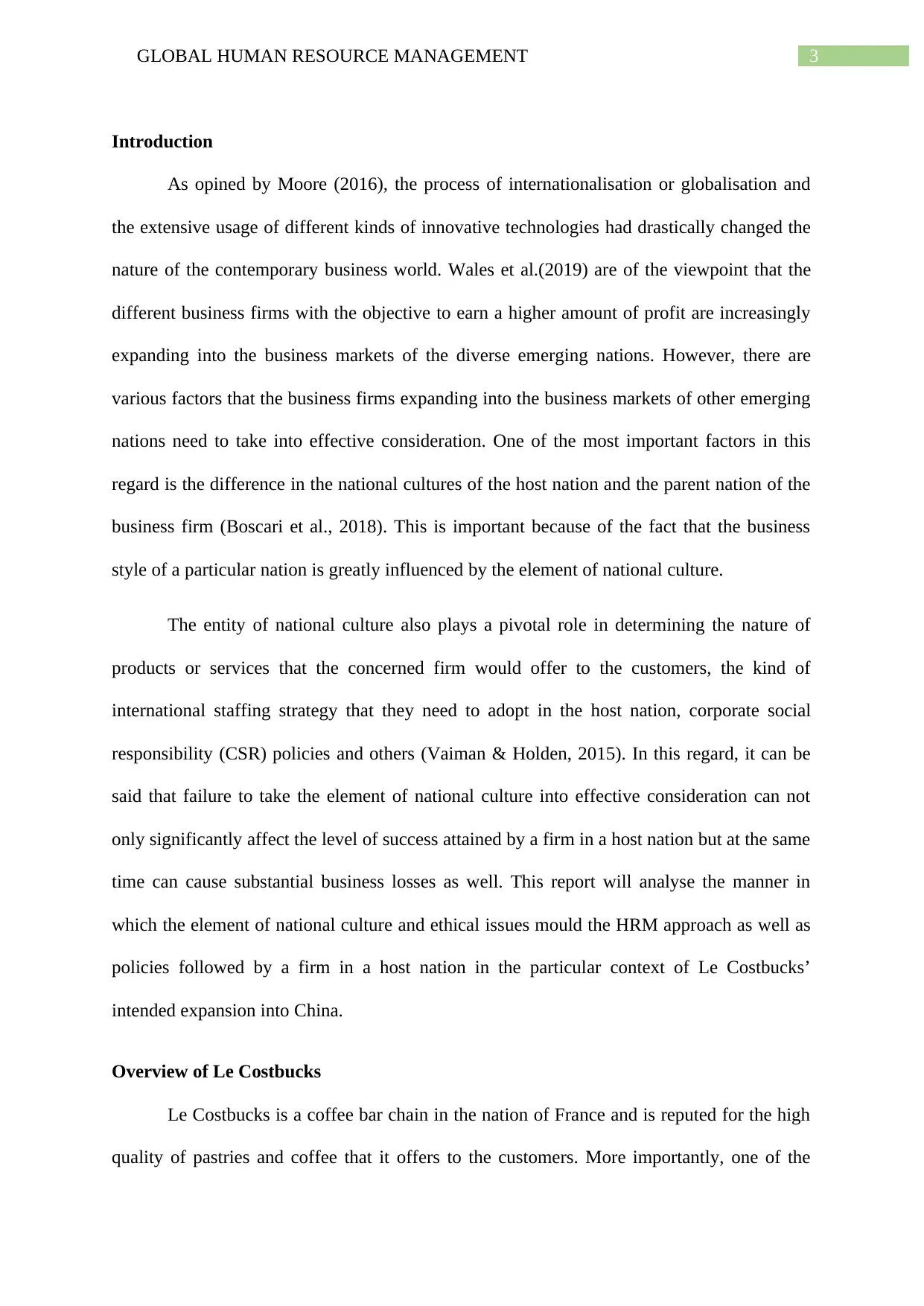
3GLOBAL HUMAN RESOURCE MANAGEMENT
Introduction
As opined by Moore (2016), the process of internationalisation or globalisation and
the extensive usage of different kinds of innovative technologies had drastically changed the
nature of the contemporary business world. Wales et al.(2019) are of the viewpoint that the
different business firms with the objective to earn a higher amount of profit are increasingly
expanding into the business markets of the diverse emerging nations. However, there are
various factors that the business firms expanding into the business markets of other emerging
nations need to take into effective consideration. One of the most important factors in this
regard is the difference in the national cultures of the host nation and the parent nation of the
business firm (Boscari et al., 2018). This is important because of the fact that the business
style of a particular nation is greatly influenced by the element of national culture.
The entity of national culture also plays a pivotal role in determining the nature of
products or services that the concerned firm would offer to the customers, the kind of
international staffing strategy that they need to adopt in the host nation, corporate social
responsibility (CSR) policies and others (Vaiman & Holden, 2015). In this regard, it can be
said that failure to take the element of national culture into effective consideration can not
only significantly affect the level of success attained by a firm in a host nation but at the same
time can cause substantial business losses as well. This report will analyse the manner in
which the element of national culture and ethical issues mould the HRM approach as well as
policies followed by a firm in a host nation in the particular context of Le Costbucks’
intended expansion into China.
Overview of Le Costbucks
Le Costbucks is a coffee bar chain in the nation of France and is reputed for the high
quality of pastries and coffee that it offers to the customers. More importantly, one of the
Introduction
As opined by Moore (2016), the process of internationalisation or globalisation and
the extensive usage of different kinds of innovative technologies had drastically changed the
nature of the contemporary business world. Wales et al.(2019) are of the viewpoint that the
different business firms with the objective to earn a higher amount of profit are increasingly
expanding into the business markets of the diverse emerging nations. However, there are
various factors that the business firms expanding into the business markets of other emerging
nations need to take into effective consideration. One of the most important factors in this
regard is the difference in the national cultures of the host nation and the parent nation of the
business firm (Boscari et al., 2018). This is important because of the fact that the business
style of a particular nation is greatly influenced by the element of national culture.
The entity of national culture also plays a pivotal role in determining the nature of
products or services that the concerned firm would offer to the customers, the kind of
international staffing strategy that they need to adopt in the host nation, corporate social
responsibility (CSR) policies and others (Vaiman & Holden, 2015). In this regard, it can be
said that failure to take the element of national culture into effective consideration can not
only significantly affect the level of success attained by a firm in a host nation but at the same
time can cause substantial business losses as well. This report will analyse the manner in
which the element of national culture and ethical issues mould the HRM approach as well as
policies followed by a firm in a host nation in the particular context of Le Costbucks’
intended expansion into China.
Overview of Le Costbucks
Le Costbucks is a coffee bar chain in the nation of France and is reputed for the high
quality of pastries and coffee that it offers to the customers. More importantly, one of the
Secure Best Marks with AI Grader
Need help grading? Try our AI Grader for instant feedback on your assignments.
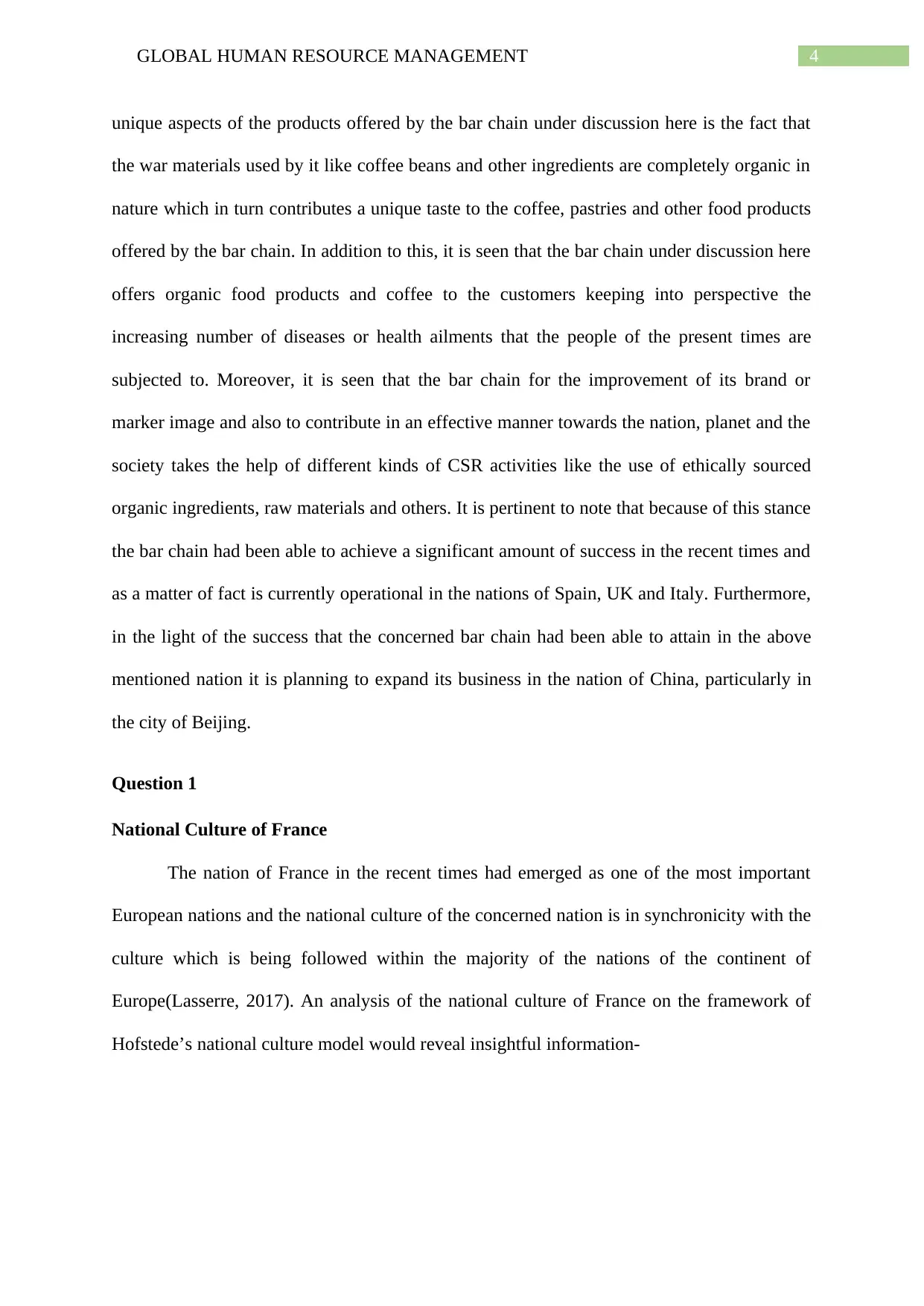
4GLOBAL HUMAN RESOURCE MANAGEMENT
unique aspects of the products offered by the bar chain under discussion here is the fact that
the war materials used by it like coffee beans and other ingredients are completely organic in
nature which in turn contributes a unique taste to the coffee, pastries and other food products
offered by the bar chain. In addition to this, it is seen that the bar chain under discussion here
offers organic food products and coffee to the customers keeping into perspective the
increasing number of diseases or health ailments that the people of the present times are
subjected to. Moreover, it is seen that the bar chain for the improvement of its brand or
marker image and also to contribute in an effective manner towards the nation, planet and the
society takes the help of different kinds of CSR activities like the use of ethically sourced
organic ingredients, raw materials and others. It is pertinent to note that because of this stance
the bar chain had been able to achieve a significant amount of success in the recent times and
as a matter of fact is currently operational in the nations of Spain, UK and Italy. Furthermore,
in the light of the success that the concerned bar chain had been able to attain in the above
mentioned nation it is planning to expand its business in the nation of China, particularly in
the city of Beijing.
Question 1
National Culture of France
The nation of France in the recent times had emerged as one of the most important
European nations and the national culture of the concerned nation is in synchronicity with the
culture which is being followed within the majority of the nations of the continent of
Europe(Lasserre, 2017). An analysis of the national culture of France on the framework of
Hofstede’s national culture model would reveal insightful information-
unique aspects of the products offered by the bar chain under discussion here is the fact that
the war materials used by it like coffee beans and other ingredients are completely organic in
nature which in turn contributes a unique taste to the coffee, pastries and other food products
offered by the bar chain. In addition to this, it is seen that the bar chain under discussion here
offers organic food products and coffee to the customers keeping into perspective the
increasing number of diseases or health ailments that the people of the present times are
subjected to. Moreover, it is seen that the bar chain for the improvement of its brand or
marker image and also to contribute in an effective manner towards the nation, planet and the
society takes the help of different kinds of CSR activities like the use of ethically sourced
organic ingredients, raw materials and others. It is pertinent to note that because of this stance
the bar chain had been able to achieve a significant amount of success in the recent times and
as a matter of fact is currently operational in the nations of Spain, UK and Italy. Furthermore,
in the light of the success that the concerned bar chain had been able to attain in the above
mentioned nation it is planning to expand its business in the nation of China, particularly in
the city of Beijing.
Question 1
National Culture of France
The nation of France in the recent times had emerged as one of the most important
European nations and the national culture of the concerned nation is in synchronicity with the
culture which is being followed within the majority of the nations of the continent of
Europe(Lasserre, 2017). An analysis of the national culture of France on the framework of
Hofstede’s national culture model would reveal insightful information-
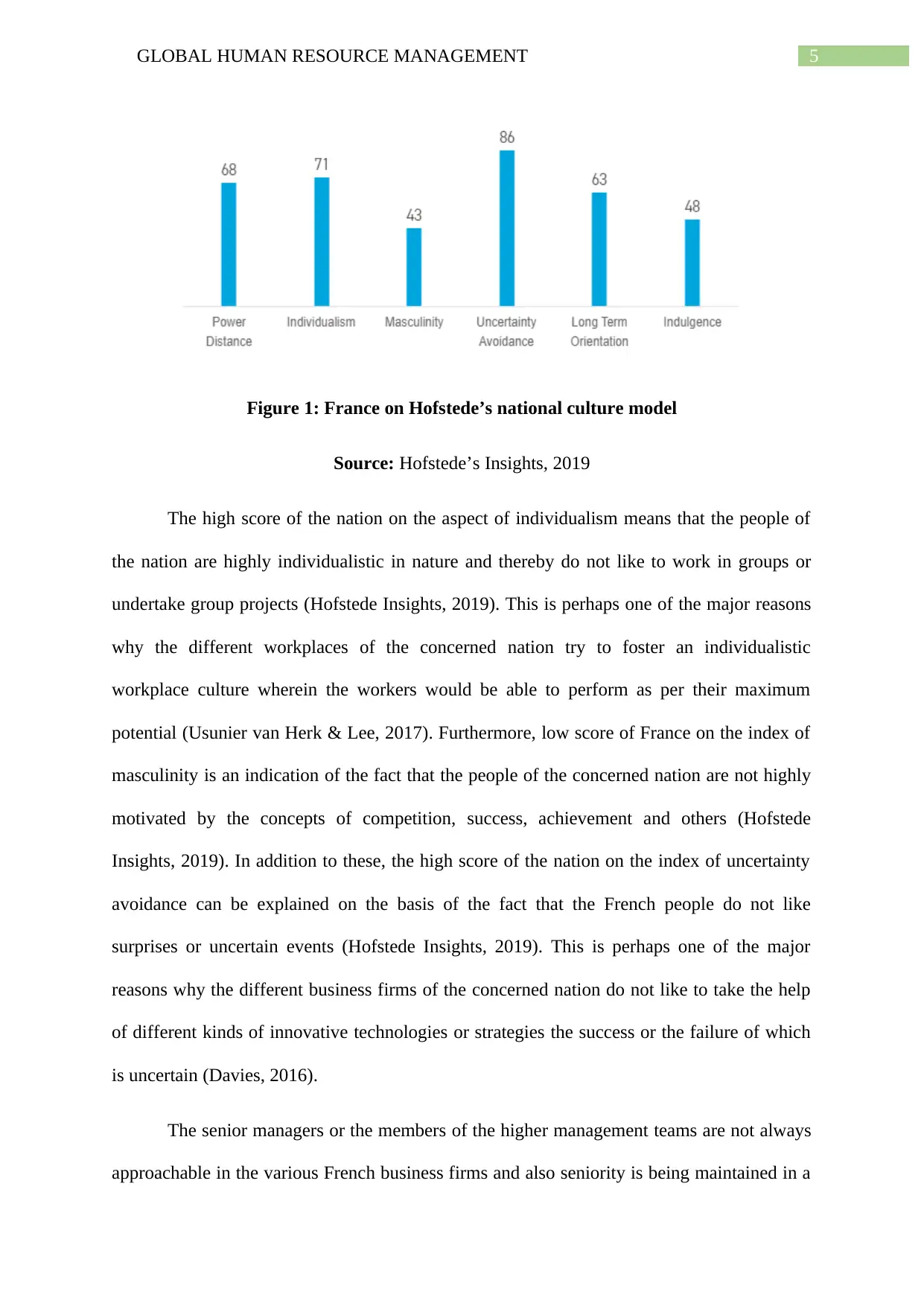
5GLOBAL HUMAN RESOURCE MANAGEMENT
Figure 1: France on Hofstede’s national culture model
Source: Hofstede’s Insights, 2019
The high score of the nation on the aspect of individualism means that the people of
the nation are highly individualistic in nature and thereby do not like to work in groups or
undertake group projects (Hofstede Insights, 2019). This is perhaps one of the major reasons
why the different workplaces of the concerned nation try to foster an individualistic
workplace culture wherein the workers would be able to perform as per their maximum
potential (Usunier van Herk & Lee, 2017). Furthermore, low score of France on the index of
masculinity is an indication of the fact that the people of the concerned nation are not highly
motivated by the concepts of competition, success, achievement and others (Hofstede
Insights, 2019). In addition to these, the high score of the nation on the index of uncertainty
avoidance can be explained on the basis of the fact that the French people do not like
surprises or uncertain events (Hofstede Insights, 2019). This is perhaps one of the major
reasons why the different business firms of the concerned nation do not like to take the help
of different kinds of innovative technologies or strategies the success or the failure of which
is uncertain (Davies, 2016).
The senior managers or the members of the higher management teams are not always
approachable in the various French business firms and also seniority is being maintained in a
Figure 1: France on Hofstede’s national culture model
Source: Hofstede’s Insights, 2019
The high score of the nation on the aspect of individualism means that the people of
the nation are highly individualistic in nature and thereby do not like to work in groups or
undertake group projects (Hofstede Insights, 2019). This is perhaps one of the major reasons
why the different workplaces of the concerned nation try to foster an individualistic
workplace culture wherein the workers would be able to perform as per their maximum
potential (Usunier van Herk & Lee, 2017). Furthermore, low score of France on the index of
masculinity is an indication of the fact that the people of the concerned nation are not highly
motivated by the concepts of competition, success, achievement and others (Hofstede
Insights, 2019). In addition to these, the high score of the nation on the index of uncertainty
avoidance can be explained on the basis of the fact that the French people do not like
surprises or uncertain events (Hofstede Insights, 2019). This is perhaps one of the major
reasons why the different business firms of the concerned nation do not like to take the help
of different kinds of innovative technologies or strategies the success or the failure of which
is uncertain (Davies, 2016).
The senior managers or the members of the higher management teams are not always
approachable in the various French business firms and also seniority is being maintained in a
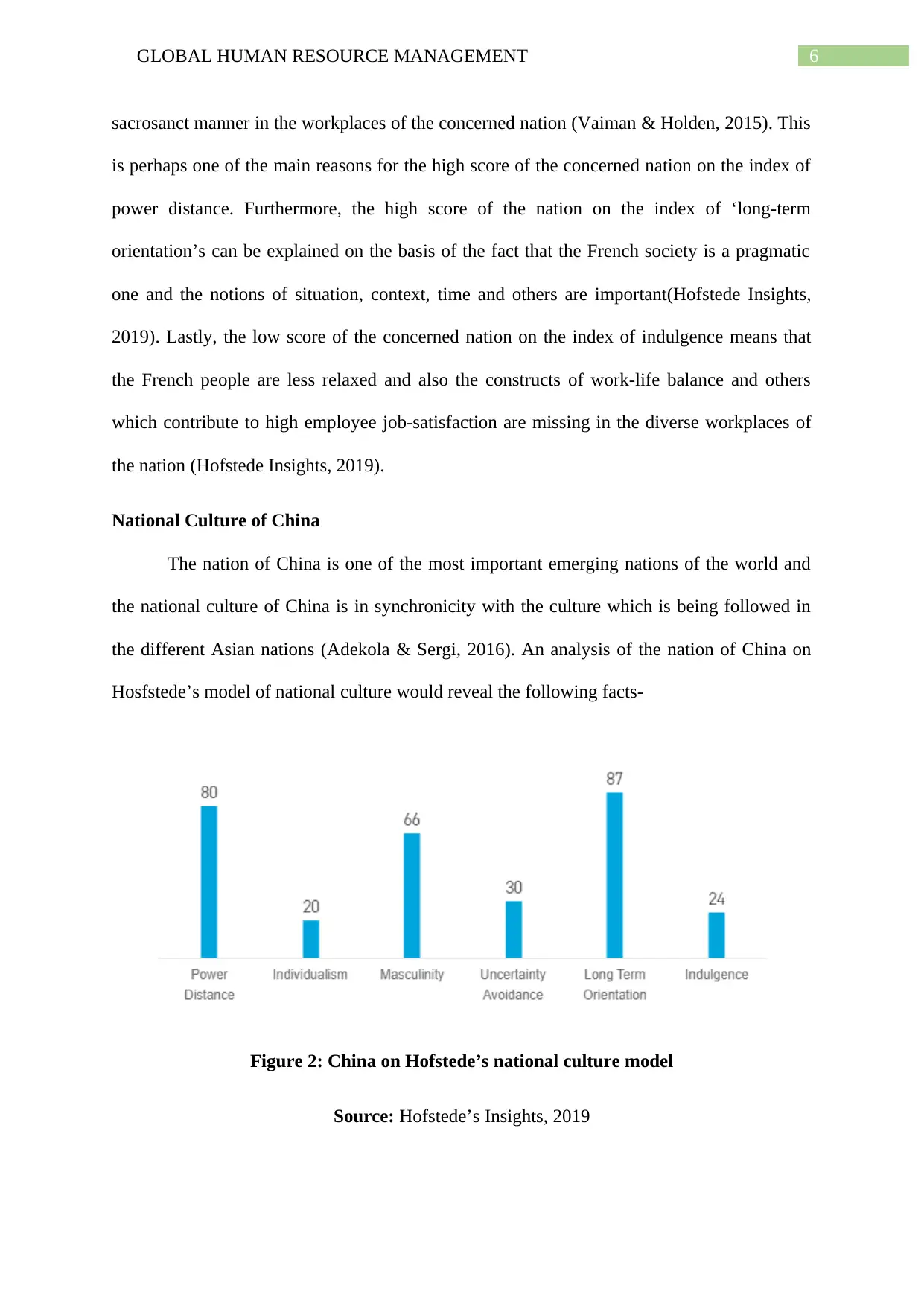
6GLOBAL HUMAN RESOURCE MANAGEMENT
sacrosanct manner in the workplaces of the concerned nation (Vaiman & Holden, 2015). This
is perhaps one of the main reasons for the high score of the concerned nation on the index of
power distance. Furthermore, the high score of the nation on the index of ‘long-term
orientation’s can be explained on the basis of the fact that the French society is a pragmatic
one and the notions of situation, context, time and others are important(Hofstede Insights,
2019). Lastly, the low score of the concerned nation on the index of indulgence means that
the French people are less relaxed and also the constructs of work-life balance and others
which contribute to high employee job-satisfaction are missing in the diverse workplaces of
the nation (Hofstede Insights, 2019).
National Culture of China
The nation of China is one of the most important emerging nations of the world and
the national culture of China is in synchronicity with the culture which is being followed in
the different Asian nations (Adekola & Sergi, 2016). An analysis of the nation of China on
Hosfstede’s model of national culture would reveal the following facts-
Figure 2: China on Hofstede’s national culture model
Source: Hofstede’s Insights, 2019
sacrosanct manner in the workplaces of the concerned nation (Vaiman & Holden, 2015). This
is perhaps one of the main reasons for the high score of the concerned nation on the index of
power distance. Furthermore, the high score of the nation on the index of ‘long-term
orientation’s can be explained on the basis of the fact that the French society is a pragmatic
one and the notions of situation, context, time and others are important(Hofstede Insights,
2019). Lastly, the low score of the concerned nation on the index of indulgence means that
the French people are less relaxed and also the constructs of work-life balance and others
which contribute to high employee job-satisfaction are missing in the diverse workplaces of
the nation (Hofstede Insights, 2019).
National Culture of China
The nation of China is one of the most important emerging nations of the world and
the national culture of China is in synchronicity with the culture which is being followed in
the different Asian nations (Adekola & Sergi, 2016). An analysis of the nation of China on
Hosfstede’s model of national culture would reveal the following facts-
Figure 2: China on Hofstede’s national culture model
Source: Hofstede’s Insights, 2019
Paraphrase This Document
Need a fresh take? Get an instant paraphrase of this document with our AI Paraphraser
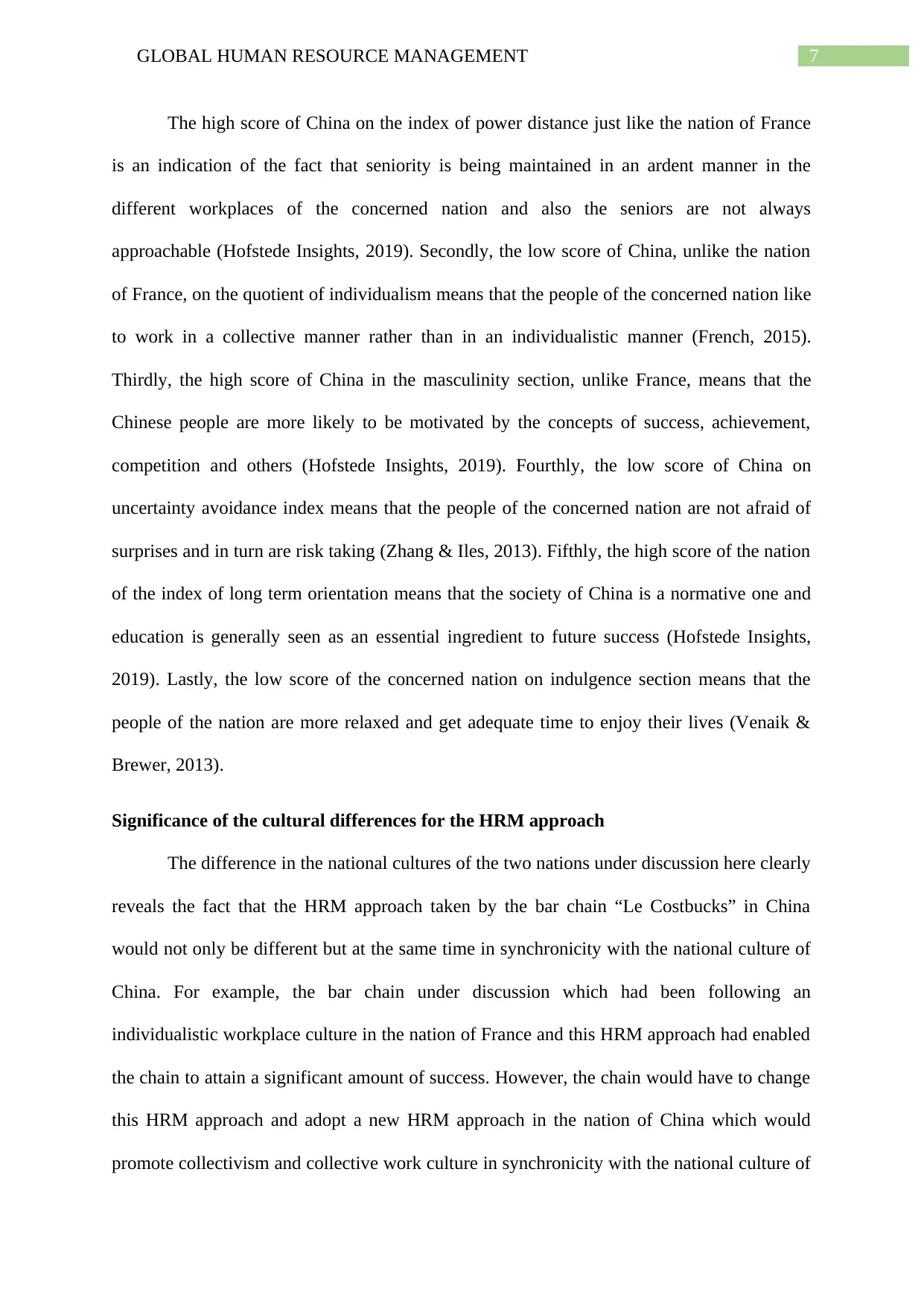
7GLOBAL HUMAN RESOURCE MANAGEMENT
The high score of China on the index of power distance just like the nation of France
is an indication of the fact that seniority is being maintained in an ardent manner in the
different workplaces of the concerned nation and also the seniors are not always
approachable (Hofstede Insights, 2019). Secondly, the low score of China, unlike the nation
of France, on the quotient of individualism means that the people of the concerned nation like
to work in a collective manner rather than in an individualistic manner (French, 2015).
Thirdly, the high score of China in the masculinity section, unlike France, means that the
Chinese people are more likely to be motivated by the concepts of success, achievement,
competition and others (Hofstede Insights, 2019). Fourthly, the low score of China on
uncertainty avoidance index means that the people of the concerned nation are not afraid of
surprises and in turn are risk taking (Zhang & Iles, 2013). Fifthly, the high score of the nation
of the index of long term orientation means that the society of China is a normative one and
education is generally seen as an essential ingredient to future success (Hofstede Insights,
2019). Lastly, the low score of the concerned nation on indulgence section means that the
people of the nation are more relaxed and get adequate time to enjoy their lives (Venaik &
Brewer, 2013).
Significance of the cultural differences for the HRM approach
The difference in the national cultures of the two nations under discussion here clearly
reveals the fact that the HRM approach taken by the bar chain “Le Costbucks” in China
would not only be different but at the same time in synchronicity with the national culture of
China. For example, the bar chain under discussion which had been following an
individualistic workplace culture in the nation of France and this HRM approach had enabled
the chain to attain a significant amount of success. However, the chain would have to change
this HRM approach and adopt a new HRM approach in the nation of China which would
promote collectivism and collective work culture in synchronicity with the national culture of
The high score of China on the index of power distance just like the nation of France
is an indication of the fact that seniority is being maintained in an ardent manner in the
different workplaces of the concerned nation and also the seniors are not always
approachable (Hofstede Insights, 2019). Secondly, the low score of China, unlike the nation
of France, on the quotient of individualism means that the people of the concerned nation like
to work in a collective manner rather than in an individualistic manner (French, 2015).
Thirdly, the high score of China in the masculinity section, unlike France, means that the
Chinese people are more likely to be motivated by the concepts of success, achievement,
competition and others (Hofstede Insights, 2019). Fourthly, the low score of China on
uncertainty avoidance index means that the people of the concerned nation are not afraid of
surprises and in turn are risk taking (Zhang & Iles, 2013). Fifthly, the high score of the nation
of the index of long term orientation means that the society of China is a normative one and
education is generally seen as an essential ingredient to future success (Hofstede Insights,
2019). Lastly, the low score of the concerned nation on indulgence section means that the
people of the nation are more relaxed and get adequate time to enjoy their lives (Venaik &
Brewer, 2013).
Significance of the cultural differences for the HRM approach
The difference in the national cultures of the two nations under discussion here clearly
reveals the fact that the HRM approach taken by the bar chain “Le Costbucks” in China
would not only be different but at the same time in synchronicity with the national culture of
China. For example, the bar chain under discussion which had been following an
individualistic workplace culture in the nation of France and this HRM approach had enabled
the chain to attain a significant amount of success. However, the chain would have to change
this HRM approach and adopt a new HRM approach in the nation of China which would
promote collectivism and collective work culture in synchronicity with the national culture of
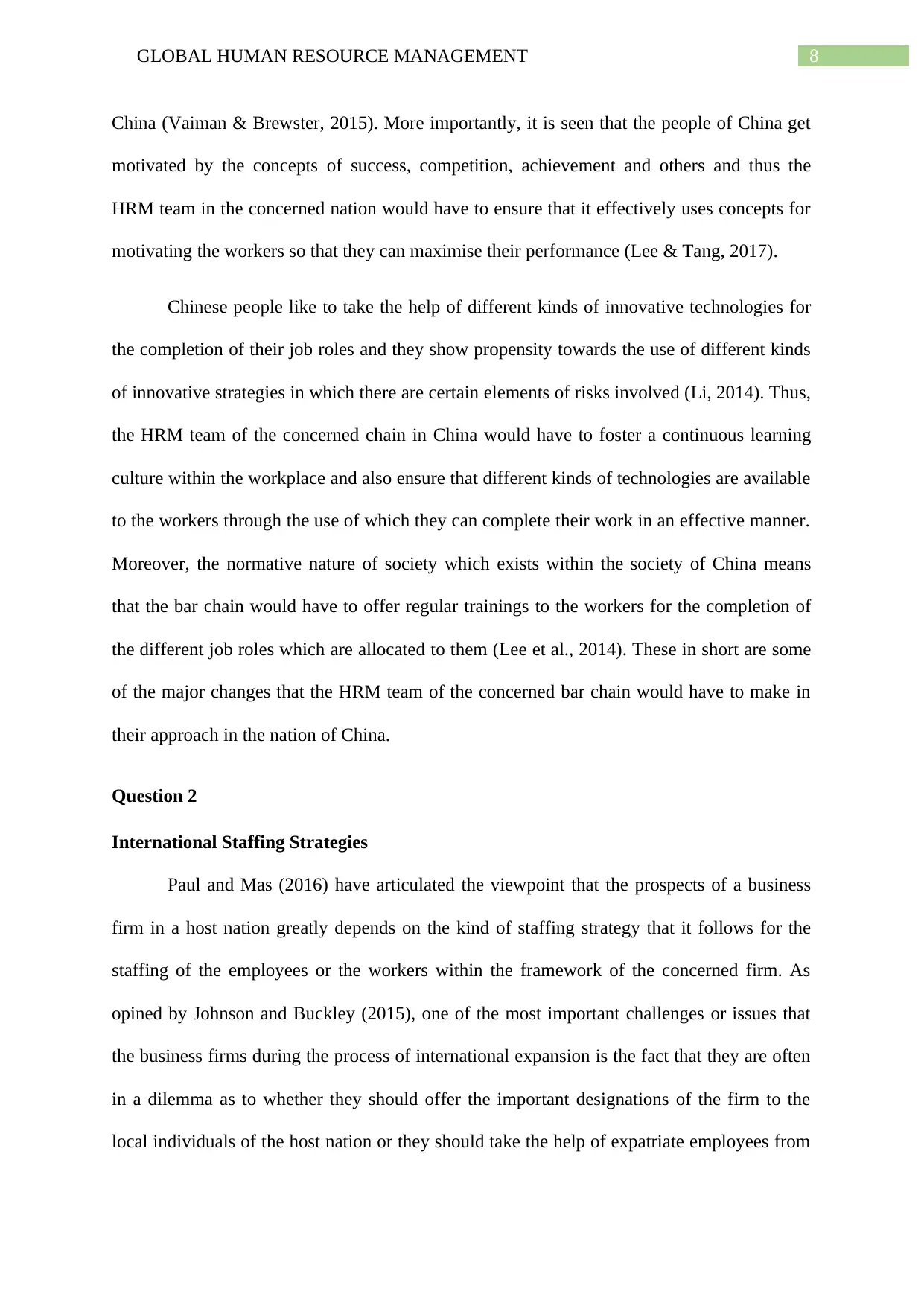
8GLOBAL HUMAN RESOURCE MANAGEMENT
China (Vaiman & Brewster, 2015). More importantly, it is seen that the people of China get
motivated by the concepts of success, competition, achievement and others and thus the
HRM team in the concerned nation would have to ensure that it effectively uses concepts for
motivating the workers so that they can maximise their performance (Lee & Tang, 2017).
Chinese people like to take the help of different kinds of innovative technologies for
the completion of their job roles and they show propensity towards the use of different kinds
of innovative strategies in which there are certain elements of risks involved (Li, 2014). Thus,
the HRM team of the concerned chain in China would have to foster a continuous learning
culture within the workplace and also ensure that different kinds of technologies are available
to the workers through the use of which they can complete their work in an effective manner.
Moreover, the normative nature of society which exists within the society of China means
that the bar chain would have to offer regular trainings to the workers for the completion of
the different job roles which are allocated to them (Lee et al., 2014). These in short are some
of the major changes that the HRM team of the concerned bar chain would have to make in
their approach in the nation of China.
Question 2
International Staffing Strategies
Paul and Mas (2016) have articulated the viewpoint that the prospects of a business
firm in a host nation greatly depends on the kind of staffing strategy that it follows for the
staffing of the employees or the workers within the framework of the concerned firm. As
opined by Johnson and Buckley (2015), one of the most important challenges or issues that
the business firms during the process of international expansion is the fact that they are often
in a dilemma as to whether they should offer the important designations of the firm to the
local individuals of the host nation or they should take the help of expatriate employees from
China (Vaiman & Brewster, 2015). More importantly, it is seen that the people of China get
motivated by the concepts of success, competition, achievement and others and thus the
HRM team in the concerned nation would have to ensure that it effectively uses concepts for
motivating the workers so that they can maximise their performance (Lee & Tang, 2017).
Chinese people like to take the help of different kinds of innovative technologies for
the completion of their job roles and they show propensity towards the use of different kinds
of innovative strategies in which there are certain elements of risks involved (Li, 2014). Thus,
the HRM team of the concerned chain in China would have to foster a continuous learning
culture within the workplace and also ensure that different kinds of technologies are available
to the workers through the use of which they can complete their work in an effective manner.
Moreover, the normative nature of society which exists within the society of China means
that the bar chain would have to offer regular trainings to the workers for the completion of
the different job roles which are allocated to them (Lee et al., 2014). These in short are some
of the major changes that the HRM team of the concerned bar chain would have to make in
their approach in the nation of China.
Question 2
International Staffing Strategies
Paul and Mas (2016) have articulated the viewpoint that the prospects of a business
firm in a host nation greatly depends on the kind of staffing strategy that it follows for the
staffing of the employees or the workers within the framework of the concerned firm. As
opined by Johnson and Buckley (2015), one of the most important challenges or issues that
the business firms during the process of international expansion is the fact that they are often
in a dilemma as to whether they should offer the important designations of the firm to the
local individuals of the host nation or they should take the help of expatriate employees from
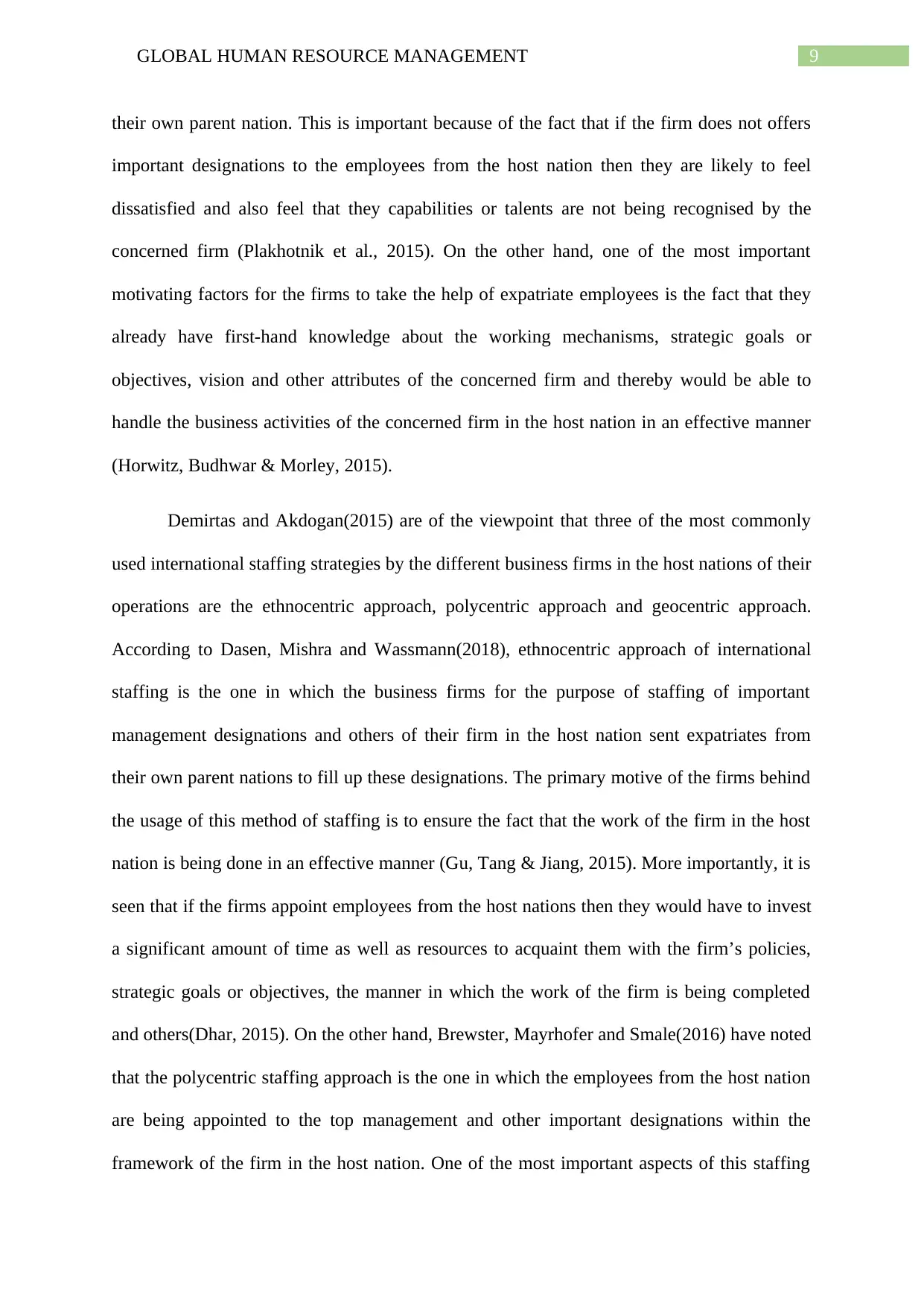
9GLOBAL HUMAN RESOURCE MANAGEMENT
their own parent nation. This is important because of the fact that if the firm does not offers
important designations to the employees from the host nation then they are likely to feel
dissatisfied and also feel that they capabilities or talents are not being recognised by the
concerned firm (Plakhotnik et al., 2015). On the other hand, one of the most important
motivating factors for the firms to take the help of expatriate employees is the fact that they
already have first-hand knowledge about the working mechanisms, strategic goals or
objectives, vision and other attributes of the concerned firm and thereby would be able to
handle the business activities of the concerned firm in the host nation in an effective manner
(Horwitz, Budhwar & Morley, 2015).
Demirtas and Akdogan(2015) are of the viewpoint that three of the most commonly
used international staffing strategies by the different business firms in the host nations of their
operations are the ethnocentric approach, polycentric approach and geocentric approach.
According to Dasen, Mishra and Wassmann(2018), ethnocentric approach of international
staffing is the one in which the business firms for the purpose of staffing of important
management designations and others of their firm in the host nation sent expatriates from
their own parent nations to fill up these designations. The primary motive of the firms behind
the usage of this method of staffing is to ensure the fact that the work of the firm in the host
nation is being done in an effective manner (Gu, Tang & Jiang, 2015). More importantly, it is
seen that if the firms appoint employees from the host nations then they would have to invest
a significant amount of time as well as resources to acquaint them with the firm’s policies,
strategic goals or objectives, the manner in which the work of the firm is being completed
and others(Dhar, 2015). On the other hand, Brewster, Mayrhofer and Smale(2016) have noted
that the polycentric staffing approach is the one in which the employees from the host nation
are being appointed to the top management and other important designations within the
framework of the firm in the host nation. One of the most important aspects of this staffing
their own parent nation. This is important because of the fact that if the firm does not offers
important designations to the employees from the host nation then they are likely to feel
dissatisfied and also feel that they capabilities or talents are not being recognised by the
concerned firm (Plakhotnik et al., 2015). On the other hand, one of the most important
motivating factors for the firms to take the help of expatriate employees is the fact that they
already have first-hand knowledge about the working mechanisms, strategic goals or
objectives, vision and other attributes of the concerned firm and thereby would be able to
handle the business activities of the concerned firm in the host nation in an effective manner
(Horwitz, Budhwar & Morley, 2015).
Demirtas and Akdogan(2015) are of the viewpoint that three of the most commonly
used international staffing strategies by the different business firms in the host nations of their
operations are the ethnocentric approach, polycentric approach and geocentric approach.
According to Dasen, Mishra and Wassmann(2018), ethnocentric approach of international
staffing is the one in which the business firms for the purpose of staffing of important
management designations and others of their firm in the host nation sent expatriates from
their own parent nations to fill up these designations. The primary motive of the firms behind
the usage of this method of staffing is to ensure the fact that the work of the firm in the host
nation is being done in an effective manner (Gu, Tang & Jiang, 2015). More importantly, it is
seen that if the firms appoint employees from the host nations then they would have to invest
a significant amount of time as well as resources to acquaint them with the firm’s policies,
strategic goals or objectives, the manner in which the work of the firm is being completed
and others(Dhar, 2015). On the other hand, Brewster, Mayrhofer and Smale(2016) have noted
that the polycentric staffing approach is the one in which the employees from the host nation
are being appointed to the top management and other important designations within the
framework of the firm in the host nation. One of the most important aspects of this staffing
Secure Best Marks with AI Grader
Need help grading? Try our AI Grader for instant feedback on your assignments.
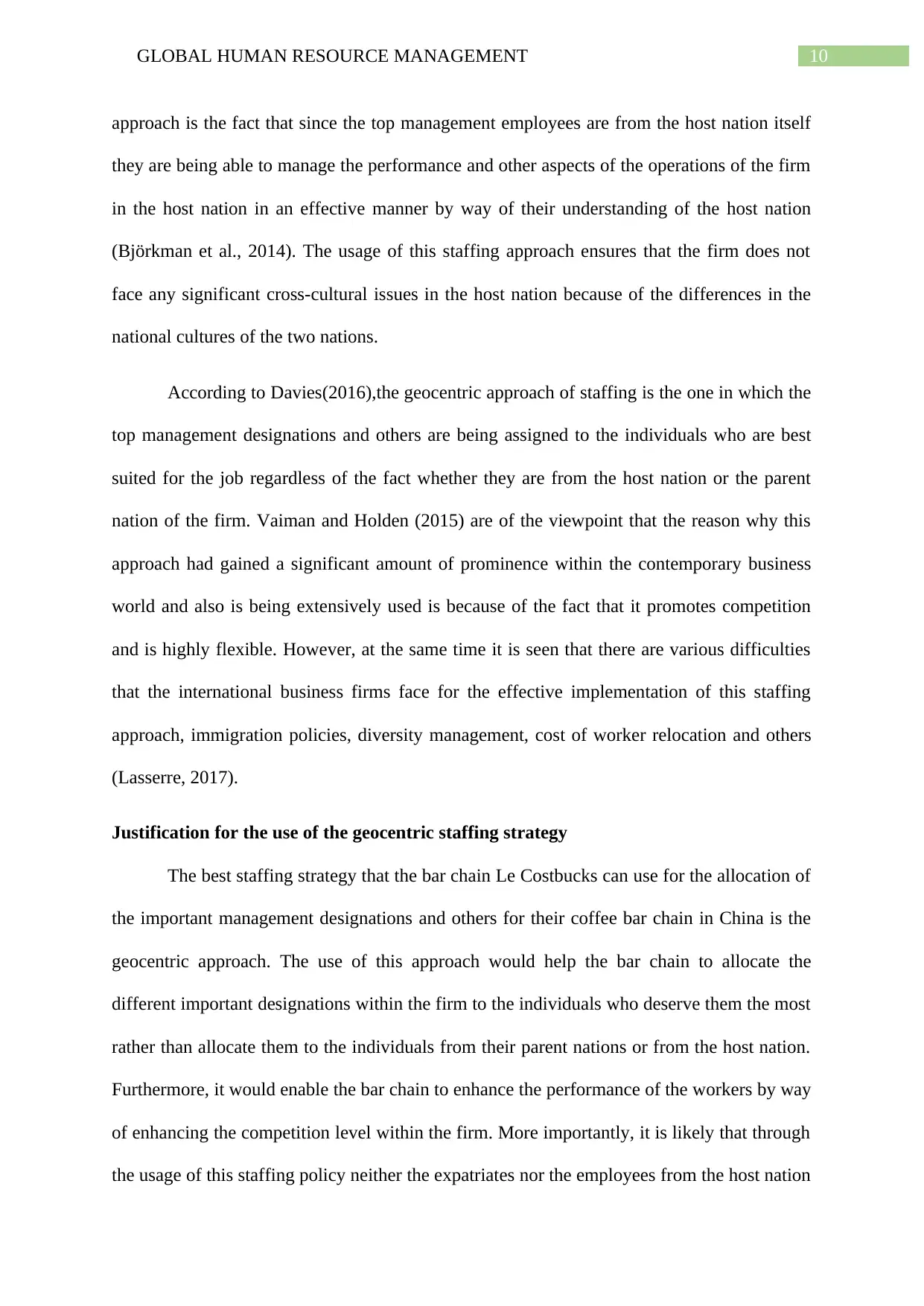
10GLOBAL HUMAN RESOURCE MANAGEMENT
approach is the fact that since the top management employees are from the host nation itself
they are being able to manage the performance and other aspects of the operations of the firm
in the host nation in an effective manner by way of their understanding of the host nation
(Björkman et al., 2014). The usage of this staffing approach ensures that the firm does not
face any significant cross-cultural issues in the host nation because of the differences in the
national cultures of the two nations.
According to Davies(2016),the geocentric approach of staffing is the one in which the
top management designations and others are being assigned to the individuals who are best
suited for the job regardless of the fact whether they are from the host nation or the parent
nation of the firm. Vaiman and Holden (2015) are of the viewpoint that the reason why this
approach had gained a significant amount of prominence within the contemporary business
world and also is being extensively used is because of the fact that it promotes competition
and is highly flexible. However, at the same time it is seen that there are various difficulties
that the international business firms face for the effective implementation of this staffing
approach, immigration policies, diversity management, cost of worker relocation and others
(Lasserre, 2017).
Justification for the use of the geocentric staffing strategy
The best staffing strategy that the bar chain Le Costbucks can use for the allocation of
the important management designations and others for their coffee bar chain in China is the
geocentric approach. The use of this approach would help the bar chain to allocate the
different important designations within the firm to the individuals who deserve them the most
rather than allocate them to the individuals from their parent nations or from the host nation.
Furthermore, it would enable the bar chain to enhance the performance of the workers by way
of enhancing the competition level within the firm. More importantly, it is likely that through
the usage of this staffing policy neither the expatriates nor the employees from the host nation
approach is the fact that since the top management employees are from the host nation itself
they are being able to manage the performance and other aspects of the operations of the firm
in the host nation in an effective manner by way of their understanding of the host nation
(Björkman et al., 2014). The usage of this staffing approach ensures that the firm does not
face any significant cross-cultural issues in the host nation because of the differences in the
national cultures of the two nations.
According to Davies(2016),the geocentric approach of staffing is the one in which the
top management designations and others are being assigned to the individuals who are best
suited for the job regardless of the fact whether they are from the host nation or the parent
nation of the firm. Vaiman and Holden (2015) are of the viewpoint that the reason why this
approach had gained a significant amount of prominence within the contemporary business
world and also is being extensively used is because of the fact that it promotes competition
and is highly flexible. However, at the same time it is seen that there are various difficulties
that the international business firms face for the effective implementation of this staffing
approach, immigration policies, diversity management, cost of worker relocation and others
(Lasserre, 2017).
Justification for the use of the geocentric staffing strategy
The best staffing strategy that the bar chain Le Costbucks can use for the allocation of
the important management designations and others for their coffee bar chain in China is the
geocentric approach. The use of this approach would help the bar chain to allocate the
different important designations within the firm to the individuals who deserve them the most
rather than allocate them to the individuals from their parent nations or from the host nation.
Furthermore, it would enable the bar chain to enhance the performance of the workers by way
of enhancing the competition level within the firm. More importantly, it is likely that through
the usage of this staffing policy neither the expatriates nor the employees from the host nation
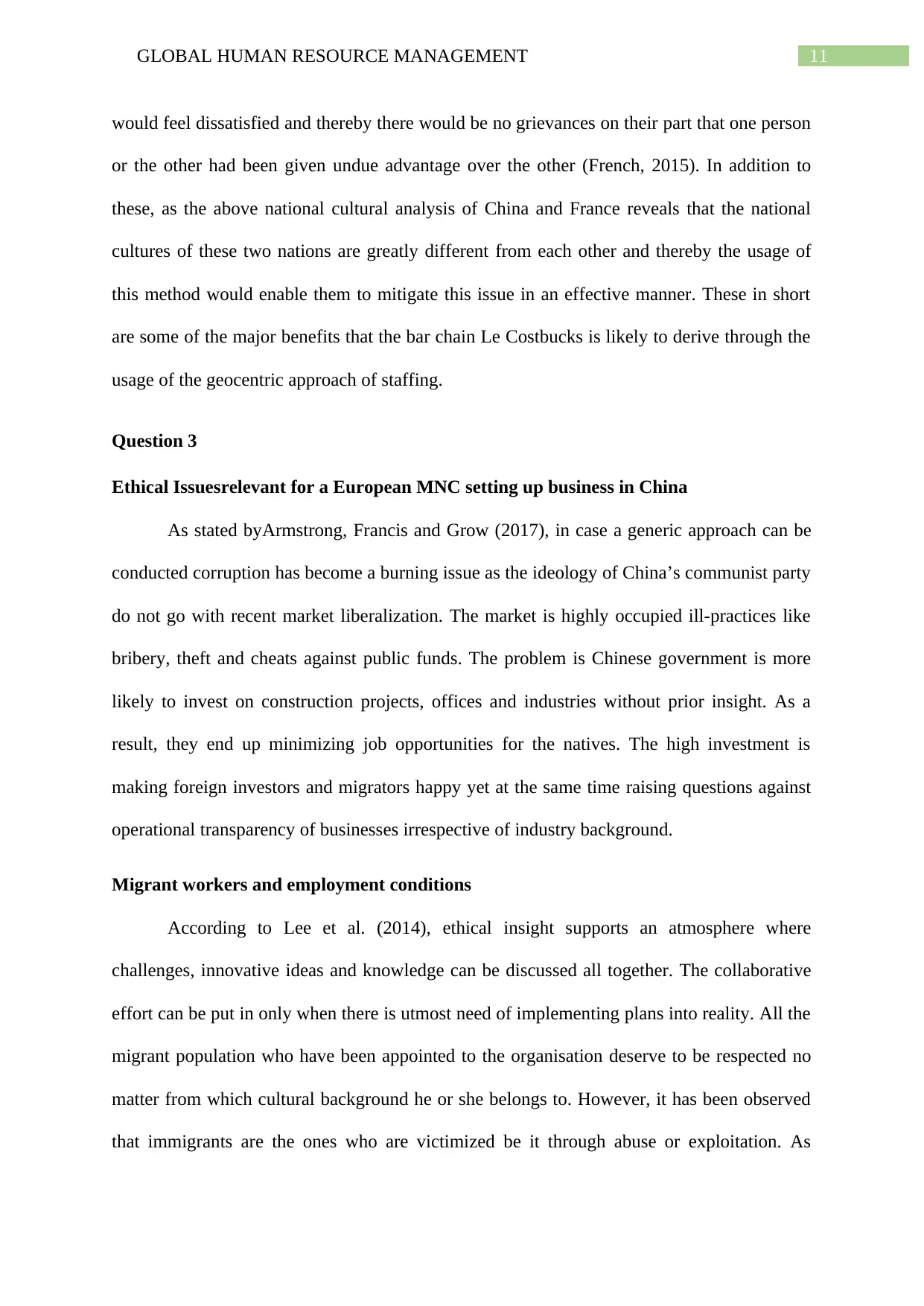
11GLOBAL HUMAN RESOURCE MANAGEMENT
would feel dissatisfied and thereby there would be no grievances on their part that one person
or the other had been given undue advantage over the other (French, 2015). In addition to
these, as the above national cultural analysis of China and France reveals that the national
cultures of these two nations are greatly different from each other and thereby the usage of
this method would enable them to mitigate this issue in an effective manner. These in short
are some of the major benefits that the bar chain Le Costbucks is likely to derive through the
usage of the geocentric approach of staffing.
Question 3
Ethical Issuesrelevant for a European MNC setting up business in China
As stated byArmstrong, Francis and Grow (2017), in case a generic approach can be
conducted corruption has become a burning issue as the ideology of China’s communist party
do not go with recent market liberalization. The market is highly occupied ill-practices like
bribery, theft and cheats against public funds. The problem is Chinese government is more
likely to invest on construction projects, offices and industries without prior insight. As a
result, they end up minimizing job opportunities for the natives. The high investment is
making foreign investors and migrators happy yet at the same time raising questions against
operational transparency of businesses irrespective of industry background.
Migrant workers and employment conditions
According to Lee et al. (2014), ethical insight supports an atmosphere where
challenges, innovative ideas and knowledge can be discussed all together. The collaborative
effort can be put in only when there is utmost need of implementing plans into reality. All the
migrant population who have been appointed to the organisation deserve to be respected no
matter from which cultural background he or she belongs to. However, it has been observed
that immigrants are the ones who are victimized be it through abuse or exploitation. As
would feel dissatisfied and thereby there would be no grievances on their part that one person
or the other had been given undue advantage over the other (French, 2015). In addition to
these, as the above national cultural analysis of China and France reveals that the national
cultures of these two nations are greatly different from each other and thereby the usage of
this method would enable them to mitigate this issue in an effective manner. These in short
are some of the major benefits that the bar chain Le Costbucks is likely to derive through the
usage of the geocentric approach of staffing.
Question 3
Ethical Issuesrelevant for a European MNC setting up business in China
As stated byArmstrong, Francis and Grow (2017), in case a generic approach can be
conducted corruption has become a burning issue as the ideology of China’s communist party
do not go with recent market liberalization. The market is highly occupied ill-practices like
bribery, theft and cheats against public funds. The problem is Chinese government is more
likely to invest on construction projects, offices and industries without prior insight. As a
result, they end up minimizing job opportunities for the natives. The high investment is
making foreign investors and migrators happy yet at the same time raising questions against
operational transparency of businesses irrespective of industry background.
Migrant workers and employment conditions
According to Lee et al. (2014), ethical insight supports an atmosphere where
challenges, innovative ideas and knowledge can be discussed all together. The collaborative
effort can be put in only when there is utmost need of implementing plans into reality. All the
migrant population who have been appointed to the organisation deserve to be respected no
matter from which cultural background he or she belongs to. However, it has been observed
that immigrants are the ones who are victimized be it through abuse or exploitation. As
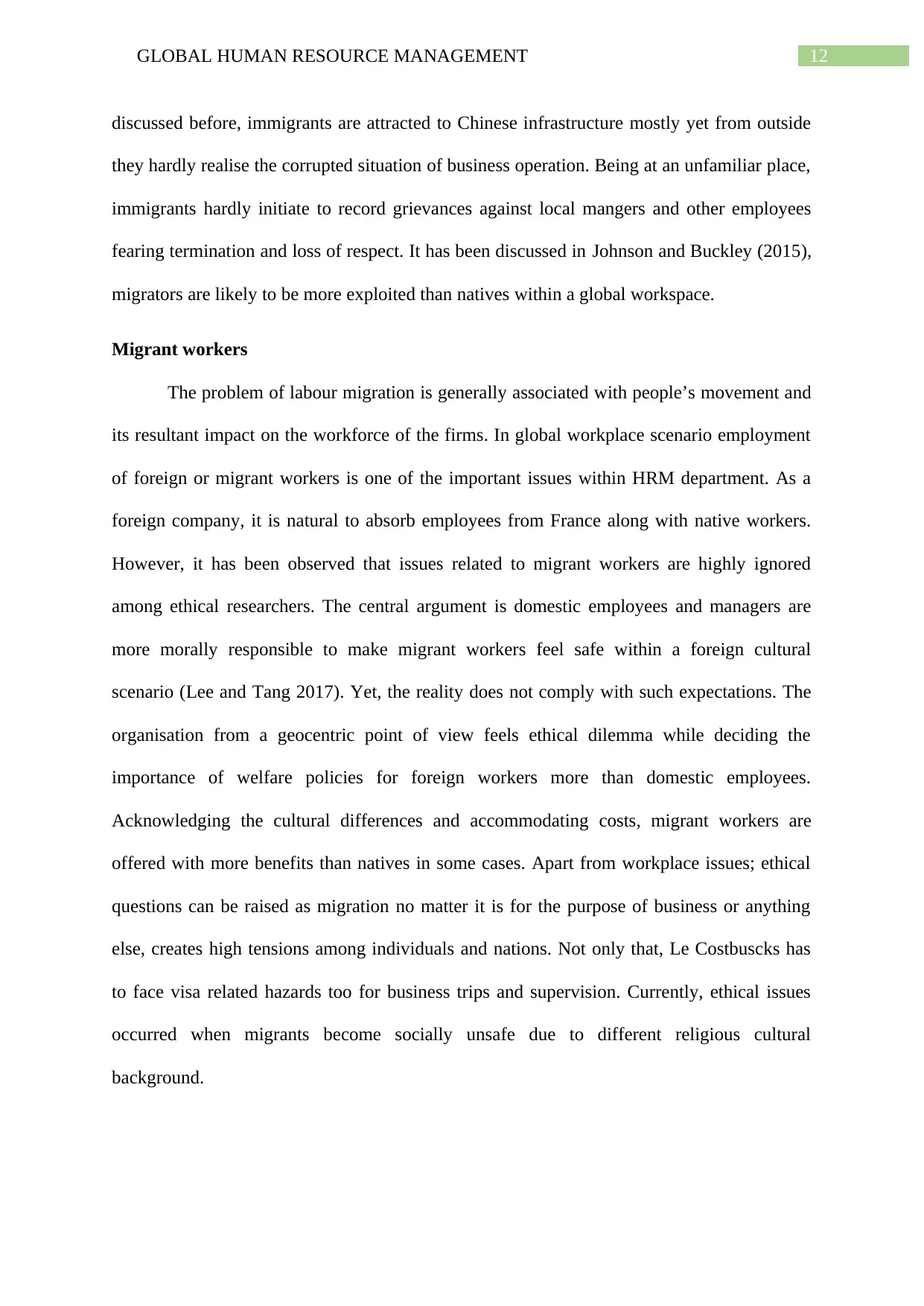
12GLOBAL HUMAN RESOURCE MANAGEMENT
discussed before, immigrants are attracted to Chinese infrastructure mostly yet from outside
they hardly realise the corrupted situation of business operation. Being at an unfamiliar place,
immigrants hardly initiate to record grievances against local mangers and other employees
fearing termination and loss of respect. It has been discussed in Johnson and Buckley (2015),
migrators are likely to be more exploited than natives within a global workspace.
Migrant workers
The problem of labour migration is generally associated with people’s movement and
its resultant impact on the workforce of the firms. In global workplace scenario employment
of foreign or migrant workers is one of the important issues within HRM department. As a
foreign company, it is natural to absorb employees from France along with native workers.
However, it has been observed that issues related to migrant workers are highly ignored
among ethical researchers. The central argument is domestic employees and managers are
more morally responsible to make migrant workers feel safe within a foreign cultural
scenario (Lee and Tang 2017). Yet, the reality does not comply with such expectations. The
organisation from a geocentric point of view feels ethical dilemma while deciding the
importance of welfare policies for foreign workers more than domestic employees.
Acknowledging the cultural differences and accommodating costs, migrant workers are
offered with more benefits than natives in some cases. Apart from workplace issues; ethical
questions can be raised as migration no matter it is for the purpose of business or anything
else, creates high tensions among individuals and nations. Not only that, Le Costbuscks has
to face visa related hazards too for business trips and supervision. Currently, ethical issues
occurred when migrants become socially unsafe due to different religious cultural
background.
discussed before, immigrants are attracted to Chinese infrastructure mostly yet from outside
they hardly realise the corrupted situation of business operation. Being at an unfamiliar place,
immigrants hardly initiate to record grievances against local mangers and other employees
fearing termination and loss of respect. It has been discussed in Johnson and Buckley (2015),
migrators are likely to be more exploited than natives within a global workspace.
Migrant workers
The problem of labour migration is generally associated with people’s movement and
its resultant impact on the workforce of the firms. In global workplace scenario employment
of foreign or migrant workers is one of the important issues within HRM department. As a
foreign company, it is natural to absorb employees from France along with native workers.
However, it has been observed that issues related to migrant workers are highly ignored
among ethical researchers. The central argument is domestic employees and managers are
more morally responsible to make migrant workers feel safe within a foreign cultural
scenario (Lee and Tang 2017). Yet, the reality does not comply with such expectations. The
organisation from a geocentric point of view feels ethical dilemma while deciding the
importance of welfare policies for foreign workers more than domestic employees.
Acknowledging the cultural differences and accommodating costs, migrant workers are
offered with more benefits than natives in some cases. Apart from workplace issues; ethical
questions can be raised as migration no matter it is for the purpose of business or anything
else, creates high tensions among individuals and nations. Not only that, Le Costbuscks has
to face visa related hazards too for business trips and supervision. Currently, ethical issues
occurred when migrants become socially unsafe due to different religious cultural
background.
Paraphrase This Document
Need a fresh take? Get an instant paraphrase of this document with our AI Paraphraser
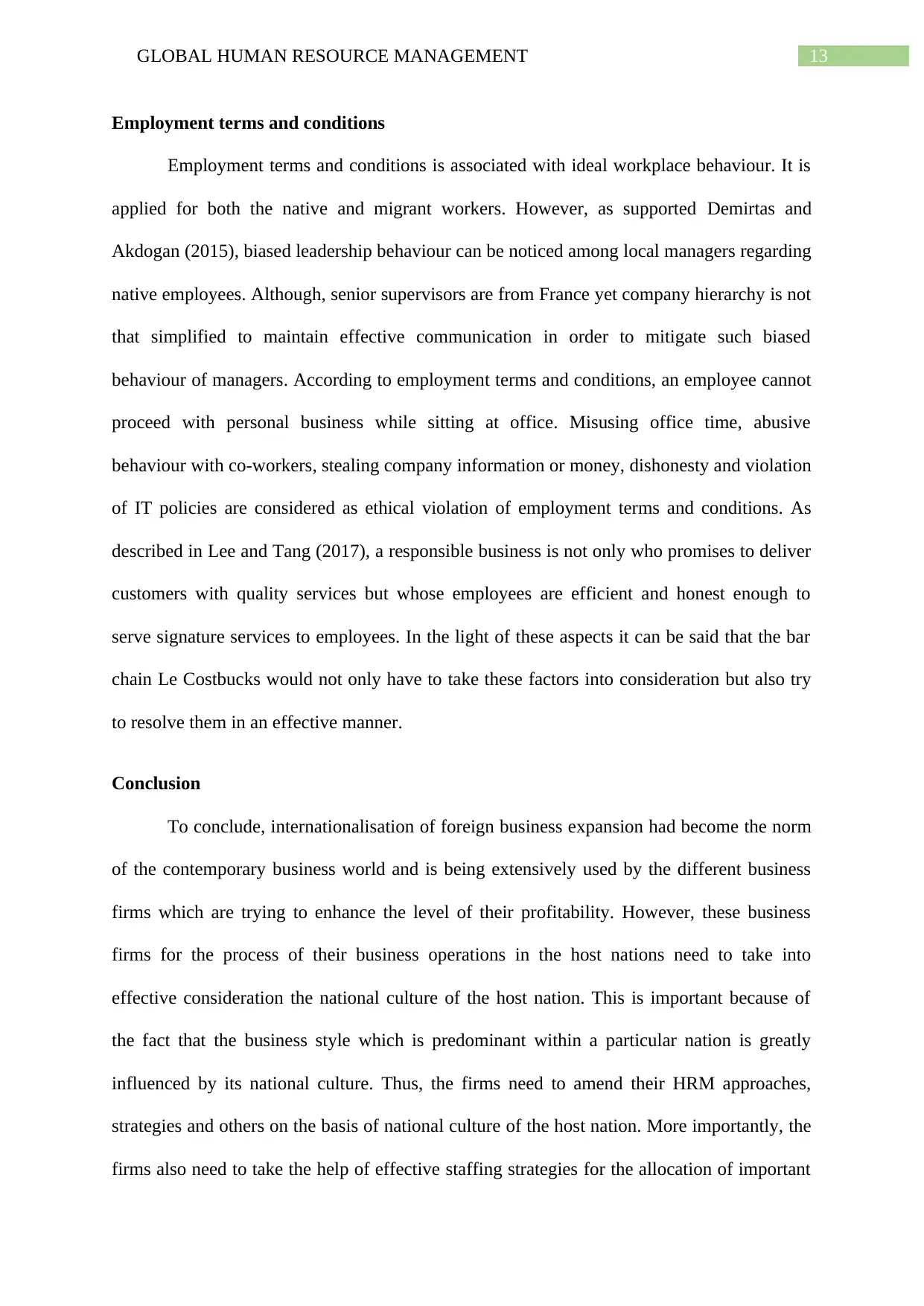
13GLOBAL HUMAN RESOURCE MANAGEMENT
Employment terms and conditions
Employment terms and conditions is associated with ideal workplace behaviour. It is
applied for both the native and migrant workers. However, as supported Demirtas and
Akdogan (2015), biased leadership behaviour can be noticed among local managers regarding
native employees. Although, senior supervisors are from France yet company hierarchy is not
that simplified to maintain effective communication in order to mitigate such biased
behaviour of managers. According to employment terms and conditions, an employee cannot
proceed with personal business while sitting at office. Misusing office time, abusive
behaviour with co-workers, stealing company information or money, dishonesty and violation
of IT policies are considered as ethical violation of employment terms and conditions. As
described in Lee and Tang (2017), a responsible business is not only who promises to deliver
customers with quality services but whose employees are efficient and honest enough to
serve signature services to employees. In the light of these aspects it can be said that the bar
chain Le Costbucks would not only have to take these factors into consideration but also try
to resolve them in an effective manner.
Conclusion
To conclude, internationalisation of foreign business expansion had become the norm
of the contemporary business world and is being extensively used by the different business
firms which are trying to enhance the level of their profitability. However, these business
firms for the process of their business operations in the host nations need to take into
effective consideration the national culture of the host nation. This is important because of
the fact that the business style which is predominant within a particular nation is greatly
influenced by its national culture. Thus, the firms need to amend their HRM approaches,
strategies and others on the basis of national culture of the host nation. More importantly, the
firms also need to take the help of effective staffing strategies for the allocation of important
Employment terms and conditions
Employment terms and conditions is associated with ideal workplace behaviour. It is
applied for both the native and migrant workers. However, as supported Demirtas and
Akdogan (2015), biased leadership behaviour can be noticed among local managers regarding
native employees. Although, senior supervisors are from France yet company hierarchy is not
that simplified to maintain effective communication in order to mitigate such biased
behaviour of managers. According to employment terms and conditions, an employee cannot
proceed with personal business while sitting at office. Misusing office time, abusive
behaviour with co-workers, stealing company information or money, dishonesty and violation
of IT policies are considered as ethical violation of employment terms and conditions. As
described in Lee and Tang (2017), a responsible business is not only who promises to deliver
customers with quality services but whose employees are efficient and honest enough to
serve signature services to employees. In the light of these aspects it can be said that the bar
chain Le Costbucks would not only have to take these factors into consideration but also try
to resolve them in an effective manner.
Conclusion
To conclude, internationalisation of foreign business expansion had become the norm
of the contemporary business world and is being extensively used by the different business
firms which are trying to enhance the level of their profitability. However, these business
firms for the process of their business operations in the host nations need to take into
effective consideration the national culture of the host nation. This is important because of
the fact that the business style which is predominant within a particular nation is greatly
influenced by its national culture. Thus, the firms need to amend their HRM approaches,
strategies and others on the basis of national culture of the host nation. More importantly, the
firms also need to take the help of effective staffing strategies for the allocation of important
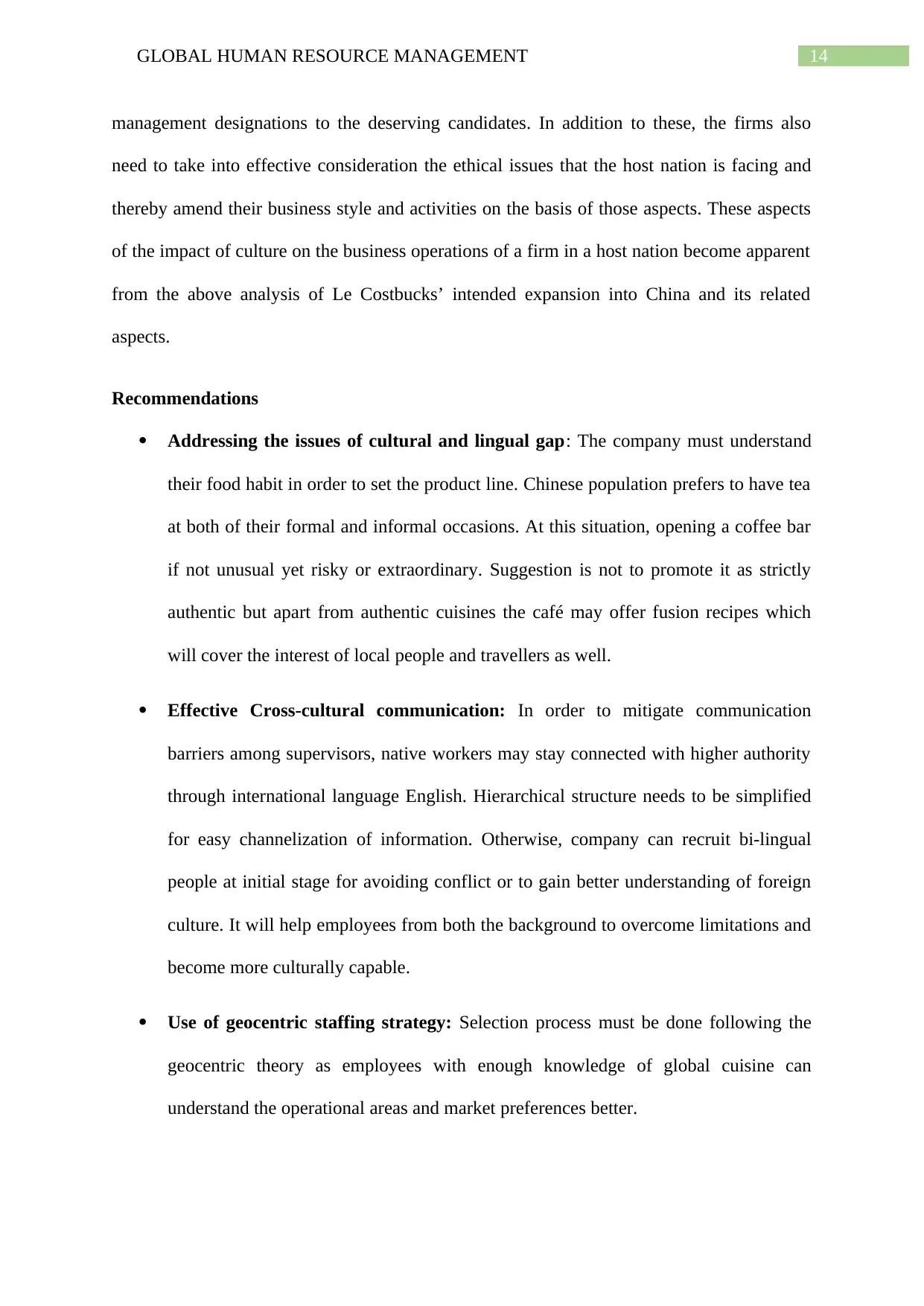
14GLOBAL HUMAN RESOURCE MANAGEMENT
management designations to the deserving candidates. In addition to these, the firms also
need to take into effective consideration the ethical issues that the host nation is facing and
thereby amend their business style and activities on the basis of those aspects. These aspects
of the impact of culture on the business operations of a firm in a host nation become apparent
from the above analysis of Le Costbucks’ intended expansion into China and its related
aspects.
Recommendations
Addressing the issues of cultural and lingual gap: The company must understand
their food habit in order to set the product line. Chinese population prefers to have tea
at both of their formal and informal occasions. At this situation, opening a coffee bar
if not unusual yet risky or extraordinary. Suggestion is not to promote it as strictly
authentic but apart from authentic cuisines the café may offer fusion recipes which
will cover the interest of local people and travellers as well.
Effective Cross-cultural communication: In order to mitigate communication
barriers among supervisors, native workers may stay connected with higher authority
through international language English. Hierarchical structure needs to be simplified
for easy channelization of information. Otherwise, company can recruit bi-lingual
people at initial stage for avoiding conflict or to gain better understanding of foreign
culture. It will help employees from both the background to overcome limitations and
become more culturally capable.
Use of geocentric staffing strategy: Selection process must be done following the
geocentric theory as employees with enough knowledge of global cuisine can
understand the operational areas and market preferences better.
management designations to the deserving candidates. In addition to these, the firms also
need to take into effective consideration the ethical issues that the host nation is facing and
thereby amend their business style and activities on the basis of those aspects. These aspects
of the impact of culture on the business operations of a firm in a host nation become apparent
from the above analysis of Le Costbucks’ intended expansion into China and its related
aspects.
Recommendations
Addressing the issues of cultural and lingual gap: The company must understand
their food habit in order to set the product line. Chinese population prefers to have tea
at both of their formal and informal occasions. At this situation, opening a coffee bar
if not unusual yet risky or extraordinary. Suggestion is not to promote it as strictly
authentic but apart from authentic cuisines the café may offer fusion recipes which
will cover the interest of local people and travellers as well.
Effective Cross-cultural communication: In order to mitigate communication
barriers among supervisors, native workers may stay connected with higher authority
through international language English. Hierarchical structure needs to be simplified
for easy channelization of information. Otherwise, company can recruit bi-lingual
people at initial stage for avoiding conflict or to gain better understanding of foreign
culture. It will help employees from both the background to overcome limitations and
become more culturally capable.
Use of geocentric staffing strategy: Selection process must be done following the
geocentric theory as employees with enough knowledge of global cuisine can
understand the operational areas and market preferences better.
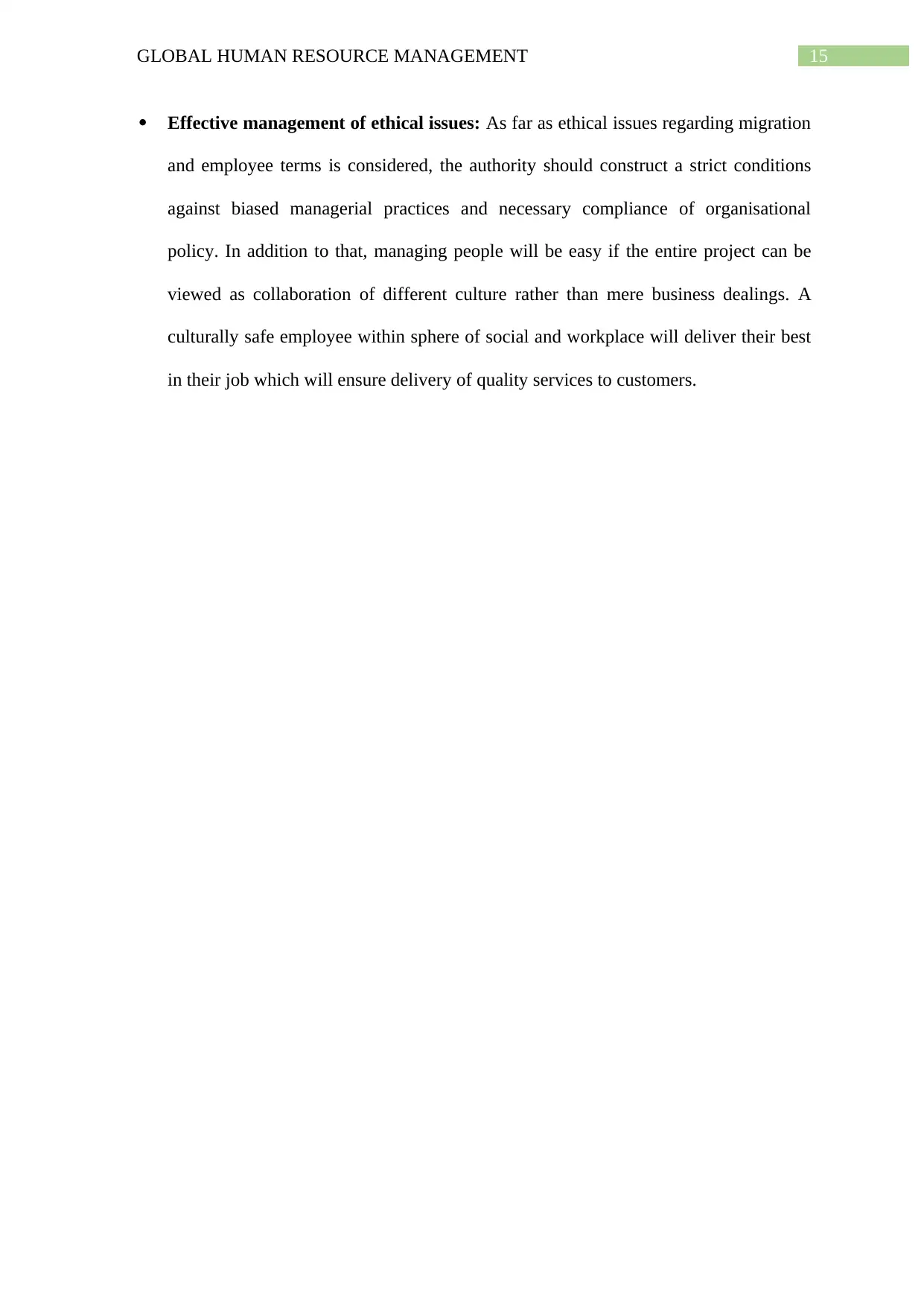
15GLOBAL HUMAN RESOURCE MANAGEMENT
Effective management of ethical issues: As far as ethical issues regarding migration
and employee terms is considered, the authority should construct a strict conditions
against biased managerial practices and necessary compliance of organisational
policy. In addition to that, managing people will be easy if the entire project can be
viewed as collaboration of different culture rather than mere business dealings. A
culturally safe employee within sphere of social and workplace will deliver their best
in their job which will ensure delivery of quality services to customers.
Effective management of ethical issues: As far as ethical issues regarding migration
and employee terms is considered, the authority should construct a strict conditions
against biased managerial practices and necessary compliance of organisational
policy. In addition to that, managing people will be easy if the entire project can be
viewed as collaboration of different culture rather than mere business dealings. A
culturally safe employee within sphere of social and workplace will deliver their best
in their job which will ensure delivery of quality services to customers.
Secure Best Marks with AI Grader
Need help grading? Try our AI Grader for instant feedback on your assignments.
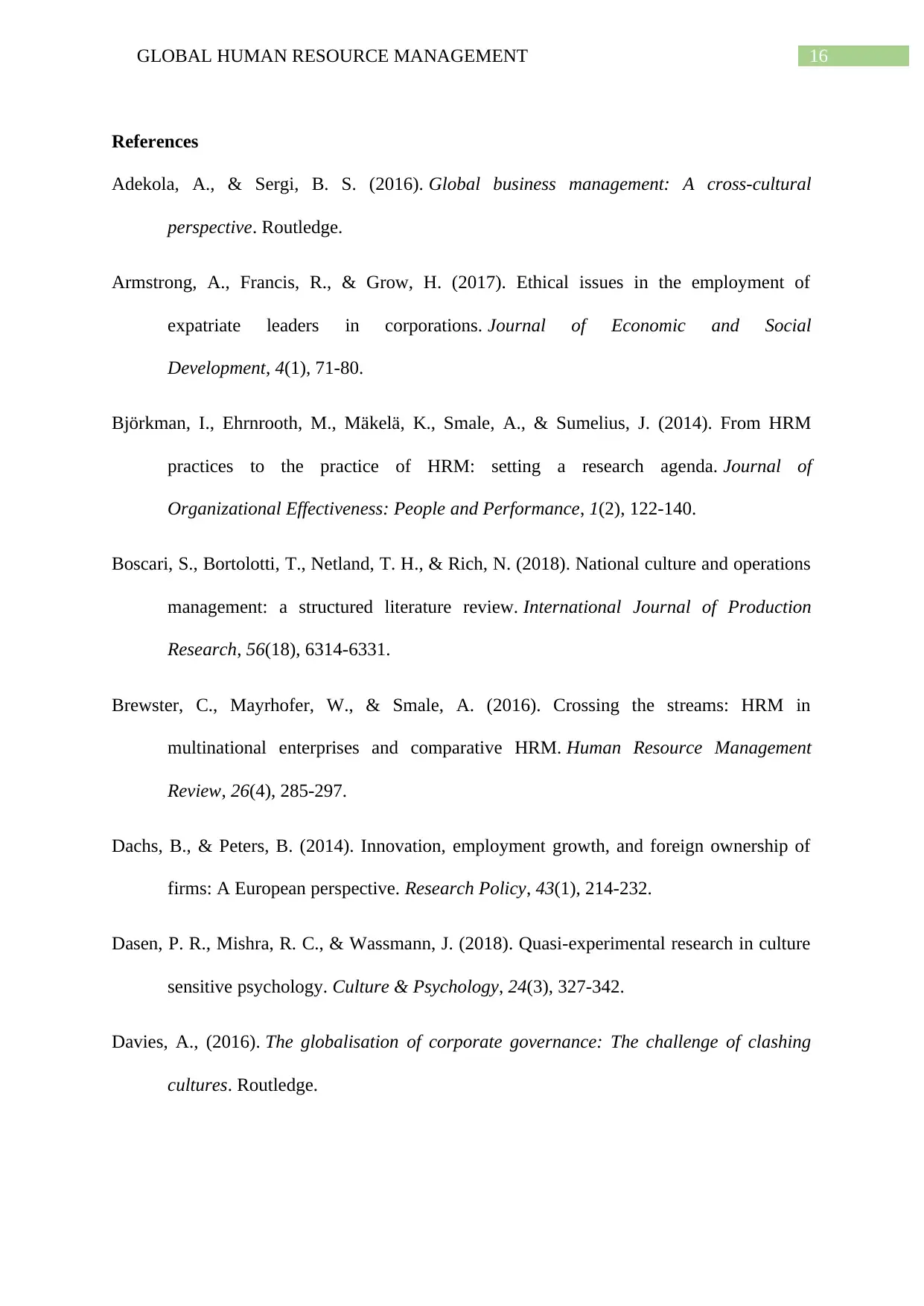
16GLOBAL HUMAN RESOURCE MANAGEMENT
References
Adekola, A., & Sergi, B. S. (2016). Global business management: A cross-cultural
perspective. Routledge.
Armstrong, A., Francis, R., & Grow, H. (2017). Ethical issues in the employment of
expatriate leaders in corporations. Journal of Economic and Social
Development, 4(1), 71-80.
Björkman, I., Ehrnrooth, M., Mäkelä, K., Smale, A., & Sumelius, J. (2014). From HRM
practices to the practice of HRM: setting a research agenda. Journal of
Organizational Effectiveness: People and Performance, 1(2), 122-140.
Boscari, S., Bortolotti, T., Netland, T. H., & Rich, N. (2018). National culture and operations
management: a structured literature review. International Journal of Production
Research, 56(18), 6314-6331.
Brewster, C., Mayrhofer, W., & Smale, A. (2016). Crossing the streams: HRM in
multinational enterprises and comparative HRM. Human Resource Management
Review, 26(4), 285-297.
Dachs, B., & Peters, B. (2014). Innovation, employment growth, and foreign ownership of
firms: A European perspective. Research Policy, 43(1), 214-232.
Dasen, P. R., Mishra, R. C., & Wassmann, J. (2018). Quasi-experimental research in culture
sensitive psychology. Culture & Psychology, 24(3), 327-342.
Davies, A., (2016). The globalisation of corporate governance: The challenge of clashing
cultures. Routledge.
References
Adekola, A., & Sergi, B. S. (2016). Global business management: A cross-cultural
perspective. Routledge.
Armstrong, A., Francis, R., & Grow, H. (2017). Ethical issues in the employment of
expatriate leaders in corporations. Journal of Economic and Social
Development, 4(1), 71-80.
Björkman, I., Ehrnrooth, M., Mäkelä, K., Smale, A., & Sumelius, J. (2014). From HRM
practices to the practice of HRM: setting a research agenda. Journal of
Organizational Effectiveness: People and Performance, 1(2), 122-140.
Boscari, S., Bortolotti, T., Netland, T. H., & Rich, N. (2018). National culture and operations
management: a structured literature review. International Journal of Production
Research, 56(18), 6314-6331.
Brewster, C., Mayrhofer, W., & Smale, A. (2016). Crossing the streams: HRM in
multinational enterprises and comparative HRM. Human Resource Management
Review, 26(4), 285-297.
Dachs, B., & Peters, B. (2014). Innovation, employment growth, and foreign ownership of
firms: A European perspective. Research Policy, 43(1), 214-232.
Dasen, P. R., Mishra, R. C., & Wassmann, J. (2018). Quasi-experimental research in culture
sensitive psychology. Culture & Psychology, 24(3), 327-342.
Davies, A., (2016). The globalisation of corporate governance: The challenge of clashing
cultures. Routledge.
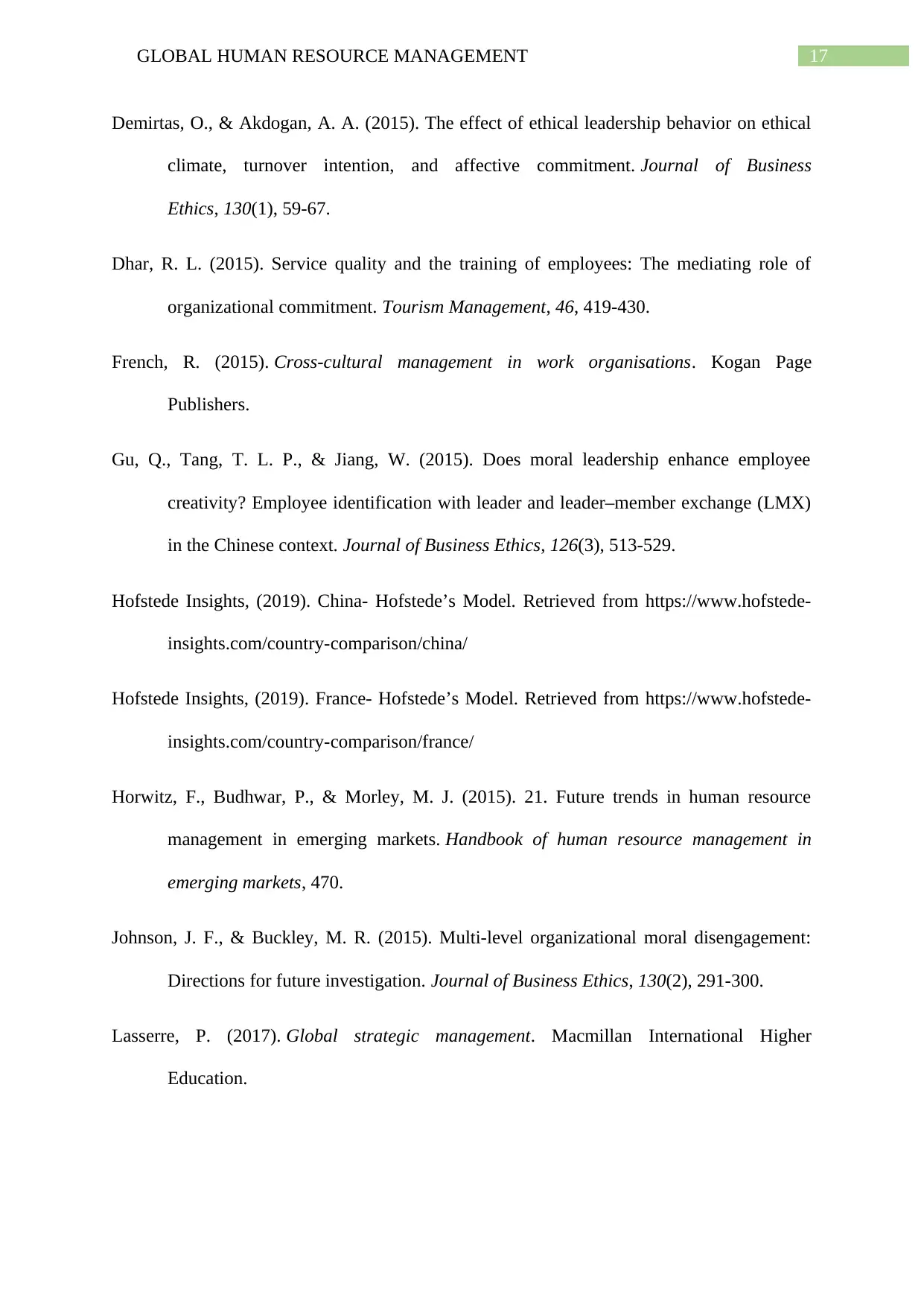
17GLOBAL HUMAN RESOURCE MANAGEMENT
Demirtas, O., & Akdogan, A. A. (2015). The effect of ethical leadership behavior on ethical
climate, turnover intention, and affective commitment. Journal of Business
Ethics, 130(1), 59-67.
Dhar, R. L. (2015). Service quality and the training of employees: The mediating role of
organizational commitment. Tourism Management, 46, 419-430.
French, R. (2015). Cross-cultural management in work organisations. Kogan Page
Publishers.
Gu, Q., Tang, T. L. P., & Jiang, W. (2015). Does moral leadership enhance employee
creativity? Employee identification with leader and leader–member exchange (LMX)
in the Chinese context. Journal of Business Ethics, 126(3), 513-529.
Hofstede Insights, (2019). China- Hofstede’s Model. Retrieved from https://www.hofstede-
insights.com/country-comparison/china/
Hofstede Insights, (2019). France- Hofstede’s Model. Retrieved from https://www.hofstede-
insights.com/country-comparison/france/
Horwitz, F., Budhwar, P., & Morley, M. J. (2015). 21. Future trends in human resource
management in emerging markets. Handbook of human resource management in
emerging markets, 470.
Johnson, J. F., & Buckley, M. R. (2015). Multi-level organizational moral disengagement:
Directions for future investigation. Journal of Business Ethics, 130(2), 291-300.
Lasserre, P. (2017). Global strategic management. Macmillan International Higher
Education.
Demirtas, O., & Akdogan, A. A. (2015). The effect of ethical leadership behavior on ethical
climate, turnover intention, and affective commitment. Journal of Business
Ethics, 130(1), 59-67.
Dhar, R. L. (2015). Service quality and the training of employees: The mediating role of
organizational commitment. Tourism Management, 46, 419-430.
French, R. (2015). Cross-cultural management in work organisations. Kogan Page
Publishers.
Gu, Q., Tang, T. L. P., & Jiang, W. (2015). Does moral leadership enhance employee
creativity? Employee identification with leader and leader–member exchange (LMX)
in the Chinese context. Journal of Business Ethics, 126(3), 513-529.
Hofstede Insights, (2019). China- Hofstede’s Model. Retrieved from https://www.hofstede-
insights.com/country-comparison/china/
Hofstede Insights, (2019). France- Hofstede’s Model. Retrieved from https://www.hofstede-
insights.com/country-comparison/france/
Horwitz, F., Budhwar, P., & Morley, M. J. (2015). 21. Future trends in human resource
management in emerging markets. Handbook of human resource management in
emerging markets, 470.
Johnson, J. F., & Buckley, M. R. (2015). Multi-level organizational moral disengagement:
Directions for future investigation. Journal of Business Ethics, 130(2), 291-300.
Lasserre, P. (2017). Global strategic management. Macmillan International Higher
Education.
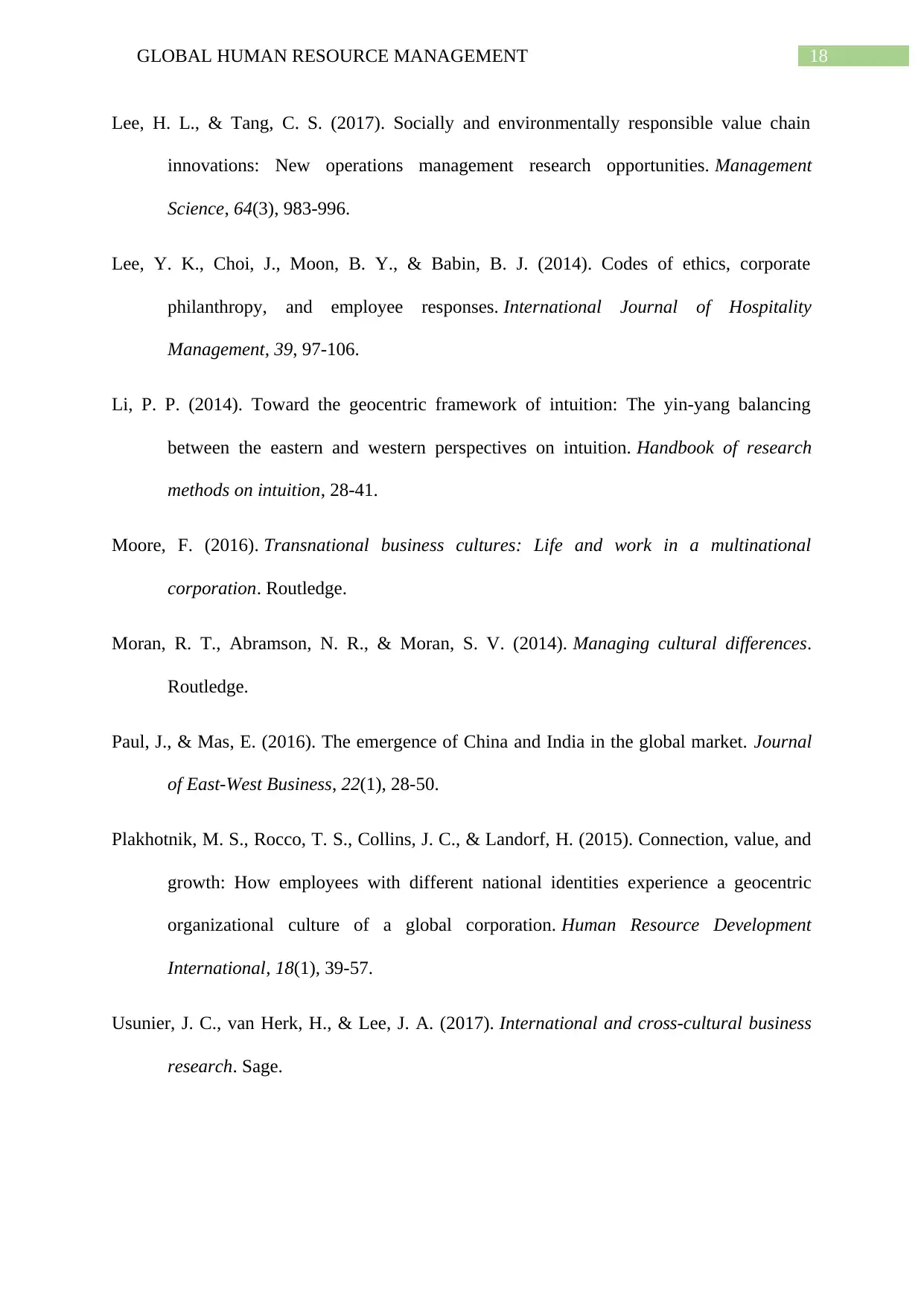
18GLOBAL HUMAN RESOURCE MANAGEMENT
Lee, H. L., & Tang, C. S. (2017). Socially and environmentally responsible value chain
innovations: New operations management research opportunities. Management
Science, 64(3), 983-996.
Lee, Y. K., Choi, J., Moon, B. Y., & Babin, B. J. (2014). Codes of ethics, corporate
philanthropy, and employee responses. International Journal of Hospitality
Management, 39, 97-106.
Li, P. P. (2014). Toward the geocentric framework of intuition: The yin-yang balancing
between the eastern and western perspectives on intuition. Handbook of research
methods on intuition, 28-41.
Moore, F. (2016). Transnational business cultures: Life and work in a multinational
corporation. Routledge.
Moran, R. T., Abramson, N. R., & Moran, S. V. (2014). Managing cultural differences.
Routledge.
Paul, J., & Mas, E. (2016). The emergence of China and India in the global market. Journal
of East-West Business, 22(1), 28-50.
Plakhotnik, M. S., Rocco, T. S., Collins, J. C., & Landorf, H. (2015). Connection, value, and
growth: How employees with different national identities experience a geocentric
organizational culture of a global corporation. Human Resource Development
International, 18(1), 39-57.
Usunier, J. C., van Herk, H., & Lee, J. A. (2017). International and cross-cultural business
research. Sage.
Lee, H. L., & Tang, C. S. (2017). Socially and environmentally responsible value chain
innovations: New operations management research opportunities. Management
Science, 64(3), 983-996.
Lee, Y. K., Choi, J., Moon, B. Y., & Babin, B. J. (2014). Codes of ethics, corporate
philanthropy, and employee responses. International Journal of Hospitality
Management, 39, 97-106.
Li, P. P. (2014). Toward the geocentric framework of intuition: The yin-yang balancing
between the eastern and western perspectives on intuition. Handbook of research
methods on intuition, 28-41.
Moore, F. (2016). Transnational business cultures: Life and work in a multinational
corporation. Routledge.
Moran, R. T., Abramson, N. R., & Moran, S. V. (2014). Managing cultural differences.
Routledge.
Paul, J., & Mas, E. (2016). The emergence of China and India in the global market. Journal
of East-West Business, 22(1), 28-50.
Plakhotnik, M. S., Rocco, T. S., Collins, J. C., & Landorf, H. (2015). Connection, value, and
growth: How employees with different national identities experience a geocentric
organizational culture of a global corporation. Human Resource Development
International, 18(1), 39-57.
Usunier, J. C., van Herk, H., & Lee, J. A. (2017). International and cross-cultural business
research. Sage.
Paraphrase This Document
Need a fresh take? Get an instant paraphrase of this document with our AI Paraphraser
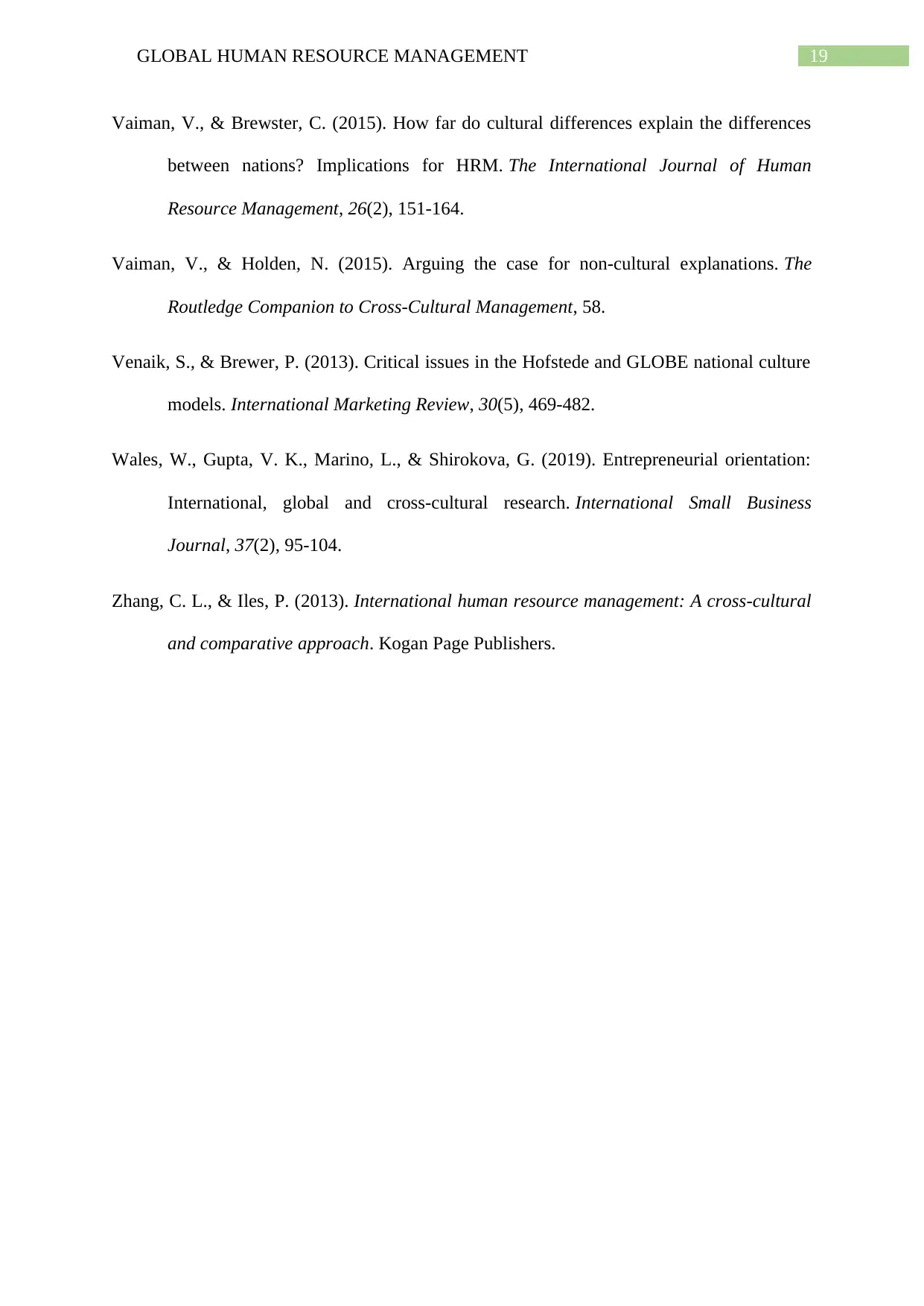
19GLOBAL HUMAN RESOURCE MANAGEMENT
Vaiman, V., & Brewster, C. (2015). How far do cultural differences explain the differences
between nations? Implications for HRM. The International Journal of Human
Resource Management, 26(2), 151-164.
Vaiman, V., & Holden, N. (2015). Arguing the case for non-cultural explanations. The
Routledge Companion to Cross-Cultural Management, 58.
Venaik, S., & Brewer, P. (2013). Critical issues in the Hofstede and GLOBE national culture
models. International Marketing Review, 30(5), 469-482.
Wales, W., Gupta, V. K., Marino, L., & Shirokova, G. (2019). Entrepreneurial orientation:
International, global and cross-cultural research. International Small Business
Journal, 37(2), 95-104.
Zhang, C. L., & Iles, P. (2013). International human resource management: A cross-cultural
and comparative approach. Kogan Page Publishers.
Vaiman, V., & Brewster, C. (2015). How far do cultural differences explain the differences
between nations? Implications for HRM. The International Journal of Human
Resource Management, 26(2), 151-164.
Vaiman, V., & Holden, N. (2015). Arguing the case for non-cultural explanations. The
Routledge Companion to Cross-Cultural Management, 58.
Venaik, S., & Brewer, P. (2013). Critical issues in the Hofstede and GLOBE national culture
models. International Marketing Review, 30(5), 469-482.
Wales, W., Gupta, V. K., Marino, L., & Shirokova, G. (2019). Entrepreneurial orientation:
International, global and cross-cultural research. International Small Business
Journal, 37(2), 95-104.
Zhang, C. L., & Iles, P. (2013). International human resource management: A cross-cultural
and comparative approach. Kogan Page Publishers.
1 out of 20
Related Documents
Your All-in-One AI-Powered Toolkit for Academic Success.
+13062052269
info@desklib.com
Available 24*7 on WhatsApp / Email
![[object Object]](/_next/static/media/star-bottom.7253800d.svg)
Unlock your academic potential
© 2024 | Zucol Services PVT LTD | All rights reserved.




